#witch script image
Explore tagged Tumblr posts
Text
The Astrology About Your Difficult Placements & Turning Them Into A Career Opportunity
Note: This post is based on my personal observations and patterns I've noticed over the years. It's important to understand that no single placement in a chart can determine whether someone is “good” or “bad,” a success or a failure, or even something as extreme as a criminal. Astrology is complex, and the entire birth chart must be considered as a whole. What we often label as "difficult" placements can actually become powerful sources of strength if we choose to approach them with awareness, effort, and a growth mindset. These placements aren’t curses, they’re invitations to evolve. This post is based on Vedic/Sidereal Astrology.
Astrology is a lot like Google Maps, it shows you possible routes to your destination, but it’s still up to you which path to take. It can guide, not dictate. That’s why I find it disheartening when some astrologers deliver overly negative interpretations that leave people feeling helpless or afraid and making serious life decisions based on it. Every placement holds multiple possibilities, some more challenging than others. With awareness and the right mindset, even the toughest placements can become powerful tools for growth.
These placements don’t doom you, they challenge you to rise.
Mars in 12th - Hidden enemies, betrayal from co-workers/colleagues, vehicle accidents, high blood pressure, imprisonment, compulsive behavior, hit man.
On the bright side, this is a good placement for martial artists, military careers, architectural /structural engineering, psychologist, working in intelligence or secret service, crime scene investigator, MMA fighter, monk, athletes, etc.
Moon in 8th - Volcanic emotions often buried. Might be emotionally manipulative in a subtle way. Intense and secretive and hide their emotions. Reads people with their x-ray vision.
On the bright side, this is a good placement for healers, astrologer, detective, investigator, researcher, astronomer, criminal profiler, hospice worker, witch, therapist, grief counselor, cult leader, etc.
Venus in 8th - Can get into surface-level relationships for "convenience". STDs, in some cases. Financial ruin from the partners. Betrays/cheats or the other way around.
On the bright side, this is a good placement for relationship counselor, sex therapist, even porn stars, financial advisor, lobbyist, artists, script writer, photographers, videographers, model, financial firm chairman, business owner, club/casino owner/worker, etc.
North Node in 1st - Prone to attract scandals, betrayals. Identity crisis. Chases validation, success or people only to feel empty. Project an image that's not real.
On the bright side, this is a good placement for social media influencer, streamer, entrepreneur, lawyer, public figure, vlogger, model, activist, etc.
Sun in 12th - Side character in their own life. Hypochondriacs. Felt underappreciated or not recognized for your self-worth. Isolate themselves when depression hits.
On the bright side, this is a good placement for foreign settlement or just moving far away from birth place where they get recognized for being an entrepreneur, startup founder, politician or govt jobs in a foreign country/state, behind-the- scenes work in the movie industry, freelancer, software engineer, etc.
Venus in 6th - Overindulgence in food/drinks. Ovarian cyst for women. Menstrual issues. Prone to get STDs. Betrayal from women. Having a crazy ex.
On the bright side, this is a good placement for service workers, emergency care, veterinarian, doctor, nurse, mental health worker, wellness coach, interior designer, HR, cosmetologist, gynaecologist, pet groomer, dog walker, plastic surgeon, Hairstylist, Makeup specialist, homemaker, hospitality worker, etc.
Mars in 6th - Workplace drama. Chronic illness. Rude to others or other way around. Betrayal from men. Might be a smoker.
On the bright side, this is a good placement for chefs, firefighters, military careers, surgeon, personal trainer, conflict resolution expert, racer, raw material manufacturer, athletes, Managerial positions in the hospitality/retail industry, architect, engineer, etc.
South node in 4th - Detachment from home life or unstable family situation. Foster care, in some cases. Odd one out of the family in some cases.
On the bright side, this is a good placement for a travel consultant/guide, social worker, game developer, life coach, realtor, real estate agent, antique items seller, costume designer, comic artist, comedian script writer, animator, VFX specialist, foster care worker, paediatrician, nutritionist, etc.
North node in 8th - Prone to get into trouble with law enforcement. Into drugs. In and out of jail in some cases. Stalker or the other way around. Pimp, in some cases.
On the bright side, this is a good placement for a criminal lawyer, police officer, forensic investigator, crime or thriller writer, crisis management expert, industrial worker, manufacturer, de-addiction center worker, activist, law enforcement, etc.
Saturn in 4th - Childhood trauma or abuse. Protein or vitamin deficiency, in some cases. Punished/emotional neglect by a parent, in some cases.
On the bright side, this is a good placement for an architect, realtor, nuclear power plant engineer/worker, zookeeper, homeless shelter worker, factory worker, volcanologist, meteorologist, nutritionist, bio tech careers, newsreader, magazine/article writer, TV show host, small business owner, carpenter, etc.
Wanna go deeper into the layers of your placements? DM me for a complete astrology reading or a 5 year/8 year marriage report or synastry reading🌙💬 and check out my pinned post for pricing + details 💫💸
Let’s decode your cosmic chaos together ⭐
Part 2 of this post will be about retrograde planets!
#astrology#astrology readings#birth chart#astro observations#astro notes#spirituality#spiritual awakening#spiritual journey#zodiac signs#vedic astrology#vedic philosophy#vedic astro notes#vedicwisdom#vedic chart#vedic astro observations#astrologer#astro placements#astro community#astro tumblr#astrology notes#astrology signs#astrology tumblr#natal placements#natal chart#natal astrology#natal aspects#astrology blog#astrology chart#astrology observations#astrology community
262 notes
·
View notes
Text
⋆˚࿔ ⋆˚࿔ 𝐝𝐚𝐧𝐜𝐞 𝐦𝐚𝐜𝐚𝐛𝐫𝐞 ; 𝐞𝐢𝐠𝐡𝐭𝐞𝐞𝐧 𝜗𝜚˚⋆𝜗𝜚˚⋆
↣ pack!tf141 x witch!reader
↣ chapter summary; you uncover a hidden truth that forces you to take responsibility despite lingering resentment. as old wounds remain fresh, some refuse to give up on the hope of redemption.
⚠️ warnings; none
★ previous ; next
☆ story masterlist

The pack was quiet on the drive home, the usual hum of conversation replaced by a heavy, contemplative silence. The truck creaked softly as they pulled into the driveway, the weight of the day still clinging to them like a second skin.
Inside the house, they moved wordlessly, each finding their own corner to settle into. Ghost disappeared into the kitchen, his movements as silent as ever. Price leaned against the back of the sofa, his arms crossed as he stared at nothing in particular. Gaz sat in the armchair, his brow furrowed as though lost in thought.
Johnny paced.
The energy radiating off him was palpable, his restlessness a stark contrast to the subdued demeanor of the others. He’d been like this for weeks—ever since the fallout with you, ever since he had gone after you against your wishes and that bloody day at Konni's.
Finally, he stopped, letting out a sharp breath like a dam breaking. “Right,” he said, his accent thick with exasperation. “I’ve got somethin’, and ye need tae hear me out.”
Gaz looked up first, arching a brow. “This’ll be good,” he muttered dryly.
Johnny shot him a glare, but the effect was diminished by the nervous energy rolling off him. He grabbed his laptop from the nearby shelf, plopping it onto the coffee table before flipping it open. The glow of the screen lit up his face as he sat cross-legged on the floor, motioning for the others to gather round.
The laptop itself was well-used, the edges slightly worn from years of handling. A few sparse stickers adorned the surface—some band logos, a faded insignia, and one that made Ghost’s gaze linger for just a second too long.
A sticker from your apothecary.
The design was simple—your shop’s name in elegant script, accompanied by a small, hand-drawn sigil you had used in its early days. It had been from when you were first promoting the place, when you had excitedly handed them out, tucking them into bags of herbs and tonics for customers, pressing them into the palms of the people you trusted.
“I’ve been… thinkin’,” he admitted, his voice softer now, the words almost awkward in their delivery.
Ghost leaned in from the kitchen doorway, his arms crossed over his broad chest as his gaze moved away from the sticker to his pack mate. “That doesn’t sound good,” he said flatly, tone dry as a desert.
Johnny ignored him, pulling up several tabs and a folder he’d clearly been organizing for a while. “Look,” he said, turning the laptop so they could all see. “I’ve been doin’ a bit o’ research. On her coven. On the town. On… everythin’.”
Gaz frowned, leaning forward. “Why?”
“Because!” He snapped, exasperated but not angry. “I needed tae understand! If we’re ever gonna fix this—if we’ve any chance of fixin’ it—we need tae ken what we’re dealin’ with!”
He clicked through several images and articles, pulling up maps, historical records, and more. “The coven’s at the heart of everythin’,” he explained, his voice quickening with conviction. “The town that surrounds it? It’s no’ just witches. It’s humans, fae, and other folk, all livin’ together in harmony. The only condition is loyalty tae the coven.”
“Loyalty,” Gaz echoed cautiously, his brows furrowing.
Soap nodded, scrolling to a section about the coven’s rules. “Aye. Loyalty. And if they have daughters? The daughters serve the coven. That’s it. Otherwise, everyone’s welcome. They’ve built somethin’ there, somethin’ solid.”
Gaz shifted in his seat, his frown deepening. “Pledging loyalty to a coven’s no small thing, mate. There’s a reason my mum never did. It’s… a big commitment.”
Johnny glanced at him, then at the others, his expression uncharacteristically serious.
Price, who had been quiet until now, finally spoke. “She’s set to become the leader of the coven,” he said, his voice steady and deliberate. “And knowing her, I’d bet she wouldn’t see it as a burden. For us, loyalty to her would feel like a privilege.”
Johnny blinked, clearly taken aback by the certainty in his tone.
Price leaned forward slightly, his arms resting on his knees. “She already has it,” he continued, his blue eyes sharp. “Our hearts, our souls—everythin’. Despite what happened, I’d say we’re more certain about it now than ever before.”
A heavy silence followed his words, the truth settling over the group like a shroud.
Ghost, still standing in the doorway, finally spoke. His voice was low and even, but there was an edge of hesitation in his tone. “.....I’ll think about it.”
The others turned to look at him, but his gaze remained fixed on the room beyond, unreadable as always.
Johnny glanced back at his laptop, his fingers drumming nervously on the edge of the table. He’d expected more pushback, but the quiet agreement—or at least consideration—from the others left him feeling relieved.
For now, the conversation hung in the air, unfinished, as each of them retreated into their own thoughts.
. . .
The frustration simmered beneath your skin, as you paced the length of your studio. Sybil’s steady gaze followed your movements, her head resting on her paws where she lay curled by the hearth. She didn’t move, but the occasional flick of her tail was enough to show she was keeping close watch, sensing your turmoil as her own.
Laswell’s interference had gone far beyond what she’d claimed.
She’d framed Leah’s arrival as her getting closure—an opportunity to heal. But this? This was manipulation. She hadn’t sent Leah to you for closure. No, she’d sent her to you for salvation.
It had been subtle at first—the way Leah had faltered as König escorted her out of the manor. Her steps had grown sluggish, her face pale, and by the time she reached the threshold, she had nearly collapsed. König had caught her effortlessly, his broad frame dwarfing her frail figure.
Your Mom had stepped in immediately. She wasn’t alone—Horangi stood close by, his expression unreadable behind the tint of his glasses, hands folded neatly behind his back as he observed. Barghest loomed nearby, her keen eyes scanning Leah with quiet intensity.
You had stood at the edge of the room, arms crossed tightly over your chest, frustration barely contained as you watched with Sybil by your side.
It was when your Mom’s expression shifted—her brow furrowing, lips pressing into a thin line—that your heart sank.
“She’s not sick,” your Mom said softly, though her tone carried the weight of something far more serious. “Not in the way you think.”
Horangi adjusted his glasses slightly, his sharp gaze flicking to you. “It’s… different,” he murmured, his usual cool detachment laced with something more cautious.
“What is it, then?” you demanded, your voice sharp enough to cut through the tension.
She hesitated, her gaze flicking briefly to Leah, who lay unconscious on the bed, before returning to you. Sybil had risen slightly, ears pricking forward, sensing the weight of the moment.
Horangi exhaled heavily, his broad shoulders rolling slightly. “It’s changed her,” he muttered, his deep voice carrying a weight of finality. “Too much time with the parasite inside her—it left a mark.”
“The parasite was in her for too long,” your Mom added. “It left an imprint. She’s… not human anymore.”
The words hit you like a physical blow, and you stared at her, your mind racing to make sense of it. “What?”
“She’s not a magical creature either,” she continued, her voice tinged with something like regret. “She’s stuck in between. Whatever the parasite did to her, it’s irreversible.”
Barghest let out a low rumble, her gaze fixed on Leah’s prone form.
“Her body isn’t rejecting magic like a human’s should,” Horangi noted, his tone more thoughtful than concerned. “But it’s not adapting to it, either. It’s in stasis.”
“Which means she needs something to anchor her,” your Mom concluded. “Something strong enough to keep her from slipping further.”
Her fingers curled against the armrest of her wheelchair, her gaze steady on you. “If we want her to survive, she’ll need to stay close to a source of magic—something strong enough to anchor her while her body finishes assimilating.”
You hadn’t needed her to elaborate. A witch’s coven, your coven, was the only viable answer.
And that was when the full weight of Laswell’s intentions had hit you. She had known. She had known that Leah needed something more, something she couldn’t provide. And so she had sent her to you, knowing you wouldn’t let her die.
The memory of it made your teeth grind as you stopped pacing, your fingers digging into the edge of the desk. Sybil rose from her spot and padded over to you, pressing her warm, wet nose against your hand. The gesture brought you back to the present, grounding you even as the anger continued to churn beneath the surface.
Laswell had played her cards well, and now Leah was your responsibility—whether you liked it or not.
For now, you had set Leah up in town, close enough to the coven’s magic to keep her stable but far enough from the manor to give yourself some distance. The thought of her being any closer was still too much.
You exhaled sharply, leaning heavily against the desk as your frustration ebbed into something quieter, heavier. Acceptance.
Leah would stay—for now. But the resentment burning in your chest wouldn’t be so easily soothed.
Her visits were a different matter altogether.
No matter how often you told her not to come, how many times you snapped, glared, or outright dismissed her, she always returned. You made no effort to mask your irritation—if anything, you let it out freely, allowing your frustration to cut through your words like a blade.
And she took it. Every annoyed sigh, every sharp retort, every time you turned your back on her, she took it without complaint.
Still, she kept coming back.
At first, it felt like defiance, another way for her to wedge herself into a space where she wasn’t welcome. But as the days stretched into weeks, you realized it wasn’t that. She wasn’t fighting against you—she was enduring you.
As if she believed this was part of her punishment.
The thought left a bitter taste in your mouth, but it didn’t stop you from lashing out. When she brought books, you barely glanced at them before shoving them aside. When she tried to help, you found ways to make her feel in the way. When she lingered too long, you pointedly ignored her until she left.
But she never stopped.
“You need these,” she’d say, matter-of-factly, setting a book on magical contracts or ancient coven traditions on your desk with the quiet confidence of someone who belonged.
Sybil would watch from her usual spot, her dark eyes shifting between the two of you, as though waiting to see who would break first.
One evening, after another round of cold, clipped responses from you, Leah finally exhaled, pressing her palms against the desk as she looked at you properly.
“I deserve this,” she murmured, so softly that, for a moment, you weren’t sure you had heard her right.
Your temper flared again, ready to snap at her, but then you saw the way she held herself—shoulders stiff, chin tilted ever so slightly downward, as if she were bracing for another verbal blow.
The fight drained from you instantly.
You hated that she thought that. That she had convinced herself this was justified.
“No,” you said, quieter than you meant to. “You don’t.”
She blinked, but didn’t argue. She just nodded, accepting the statement as fact, but something in her shoulders eased ever so slightly.
You sighed and gestured at the treaty she had been reviewing, your frustration ebbing into something else—something closer to exhaustion. “What were you saying about the wording?”
She hesitated at the sudden shift but gathered herself quickly, sliding the document back toward her. Sybil stretched lazily near your feet, her tail flicking idly, as Leah pointed to a section of the draft.
“This part. The phrasing is vague—it could be interpreted in a way that gives your mother leverage later.”
You studied it, eyes narrowing. She was right.
“I didn’t expect you to be good at this,” you admitted, catching her off guard.
She laughed softly, the sound almost disbelieving. “I was studying to be a lawyer, remember? Before all of this happened.”
You nodded slowly, your gaze flicking to Sybil, who tilted her head slightly as if in approval. “I guess I forgot.”
Her expression softened, and though the distance between you both remained, it felt less insurmountable than before.
Little by little, the jagged edges of your shared history began to smooth. Slowly but surely.
. . .
The dimly lit bathroom was filled with the quiet hum of the electric razor in Ghost’s hands. He held it awkwardly, his fingers stiff around the handle as if it were a weapon he hadn’t been trained to use. Johnny sat on a stool in front of him, a towel draped around his shoulders, his unruly hair ready for the transformation back into his signature mohawk.
“Careful, big man,” Johnny teased, his thick accent carrying a playful edge. “I’ve got enough scars. Don’t go addin’ tae the collection, aye?”
Ghost let out a quiet grunt, tilting Johnny’s head slightly to one side as he began shaving the sides of his head. “Keep still, or you’ll get what you’re askin’ for.”
The clumsiness in Ghost’s hands was deliberate—Johnny had insisted on his help for this reason alone. It wasn’t about precision; it was about the time spent, the bond shared in this one quiet moment.
For a while, they worked in silence, the razor buzzing and the occasional clump of hair falling to the floor. But Johnny wasn’t one to let silence linger too long.
“So,” he began casually, his tone light but probing. “Gonna tell me what’s got ye tied up in knots?”
Ghost didn’t answer immediately, his focus seemingly fixed on the next section of Soap’s hair.
“C’mon, Simon,” Johnny pressed, his voice softening. “We all know somethin’s eatin’ at ye. Let it out, mate.”
Ghost exhaled slowly, his hand stilling for a moment before resuming its work. “It’s nothin’,” he muttered.
Johnny snorted. “Aye, and I’m a bloody unicorn. Try again.”
There was another long pause, the weight of it growing heavier with each passing second. Finally, Ghost set the razor down on the counter and leaned against the sink, his gloved hands gripping the edge tightly.
“I’m afraid,” he said, his voice low, almost a whisper.
Johnny turned in his seat, his gaze searching Ghost’s face, even though the mask hid most of his expression. “Afraid of what?”
Ghost stared at the wall in front of him, his shoulders tense. “Of what I did. Of what I could’ve done. That night…” He trailed off, his hands tightening around the sink. “I don’t remember much, but I know I hurt her. Sybil too.”
His voice cracked slightly, and he shook his head. “She’s our bird, Johnny. Our jewel. My everythin’. And the thought that I… That I could’ve—”
Ghost broke off again, his jaw tightening. “She’s not the same anymore. She’s cold now. Frigid. And I can’t help but think it’s my fault.”
Johnny’s usual light-hearted demeanor softened as he listened. He reached up, clapping a hand on Ghost’s arm. “Simon,” he said gently, “ye messed up. Aye, ye made a mistake—a big one. But we all did, mate. It wasn’t just ye.”
Ghost glanced at him, his eyes shadowed and unsure.
“And maybe this was the wake-up call we needed,” Johnny continued, his tone more serious than usual. “We were treatin’ her like she was somethin’ fragile. A wee thing tae keep safe and warm and away from the world.”
He shook his head, a rare note of wisdom shining through. “But she’s not that, Simon. She’s her own person. Her own beauty. And it’s about bloody time we showed her we see that. That we respect it.”
Ghost stared at him, the weight of his words settling over him like a heavy cloak. “And what if she doesn’t forgive us?” he asked quietly.
Johnny grinned faintly, his usual cheekiness returning for a moment. “Then we keep tryin’, big man. ‘Cause if there’s one thing she’s taught us, it’s that we’ve got tae earn it.”
The razor buzzed back to life as Ghost picked it up again, his hands steadier this time. Johnny straightened, letting him finish the job, a small smile tugging at his lips as the tension in the room began to ease.
For the first time in a long while, Ghost felt something close to hope.

banner credit
#cod#cod fanfiction#cod fanfic#cod x reader#cod x you#simon ghost riley#simon ghost riley x reader#simon ghost riley x you#ghost x reader#ghost x you#john soap mactavish#john soap mactavish x reader#john soap mactavish x you#soap x reader#soap x you#kyle gaz garrick#kyle gaz garrick x reader#kyle gaz garrick x you#gaz x reader#gaz x you#john price#john price x reader#john price x you#price x reader#price x you#task force 141#task force 141 x reader#task force 141 x you#tf 141#tf 141 x reader
171 notes
·
View notes
Text
Fanmade TVC Book Covers: Inspired by The Vampire Armand

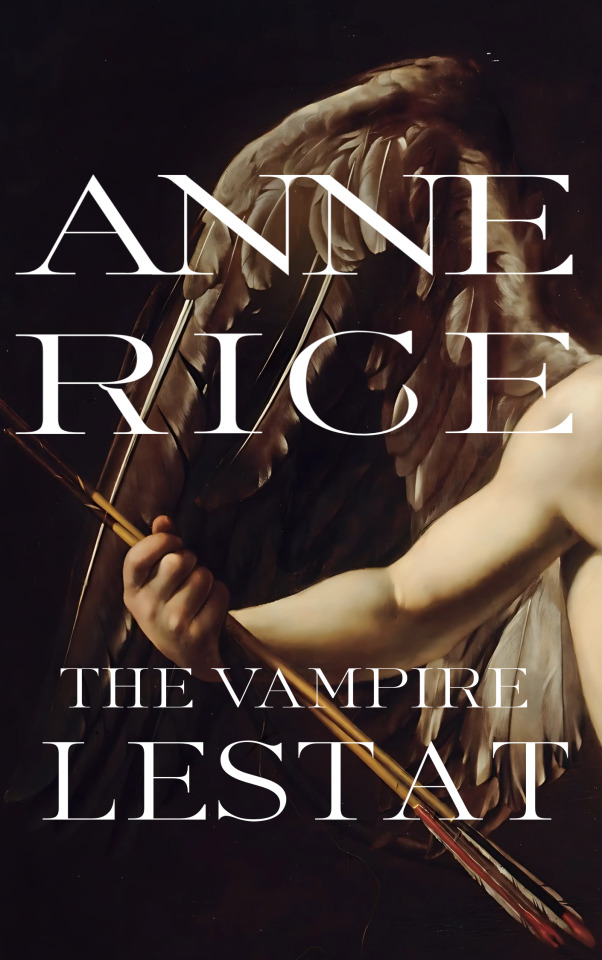
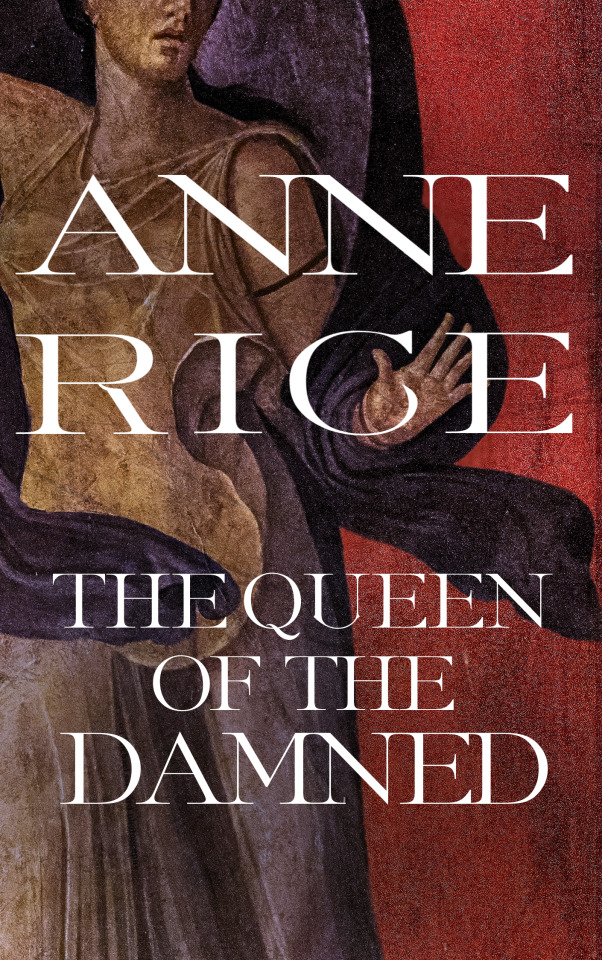

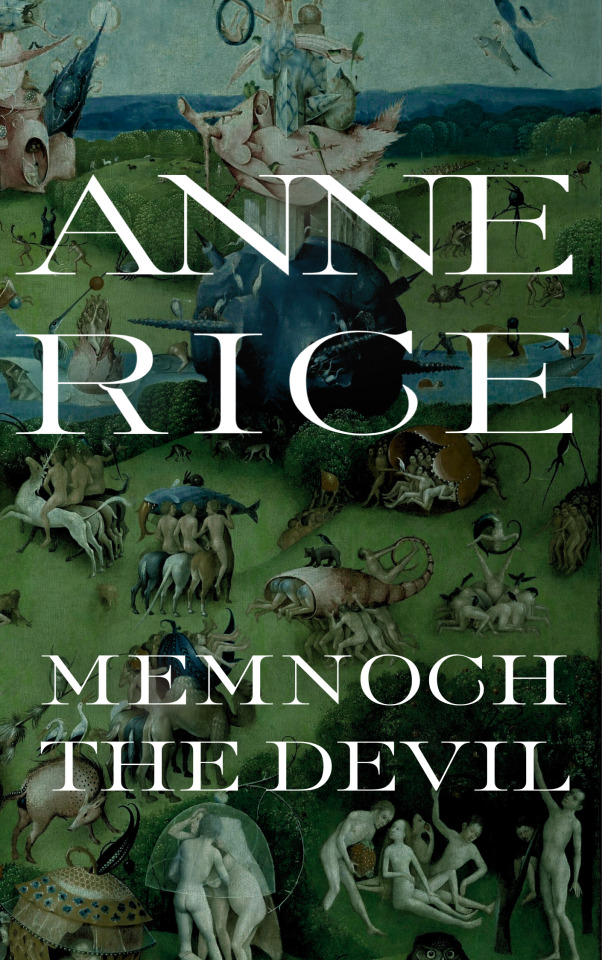
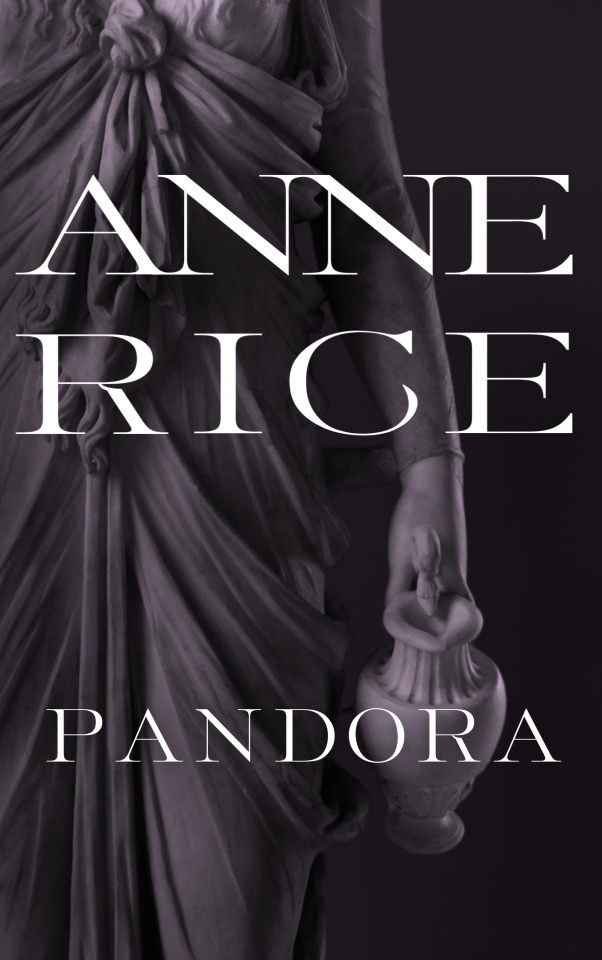
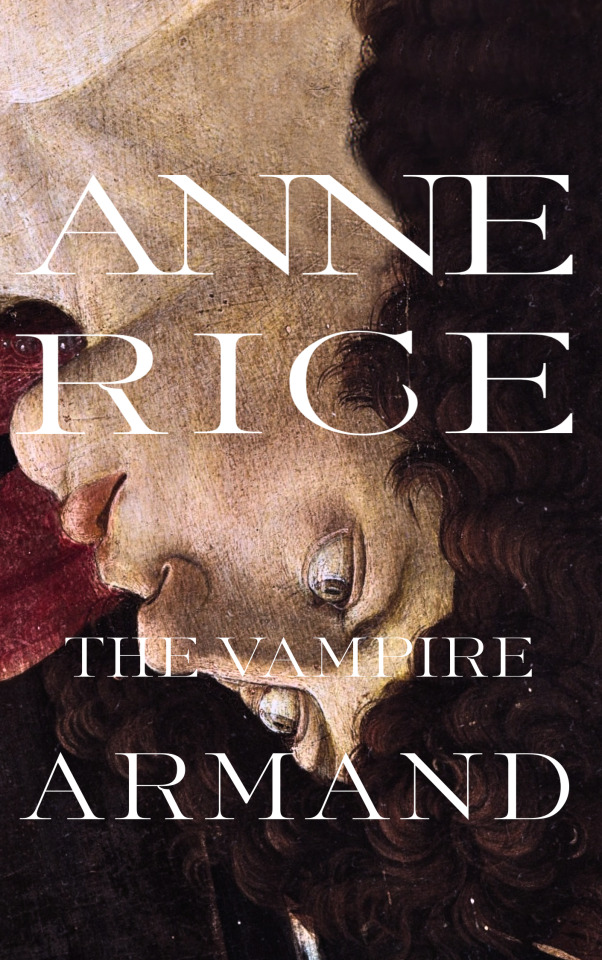

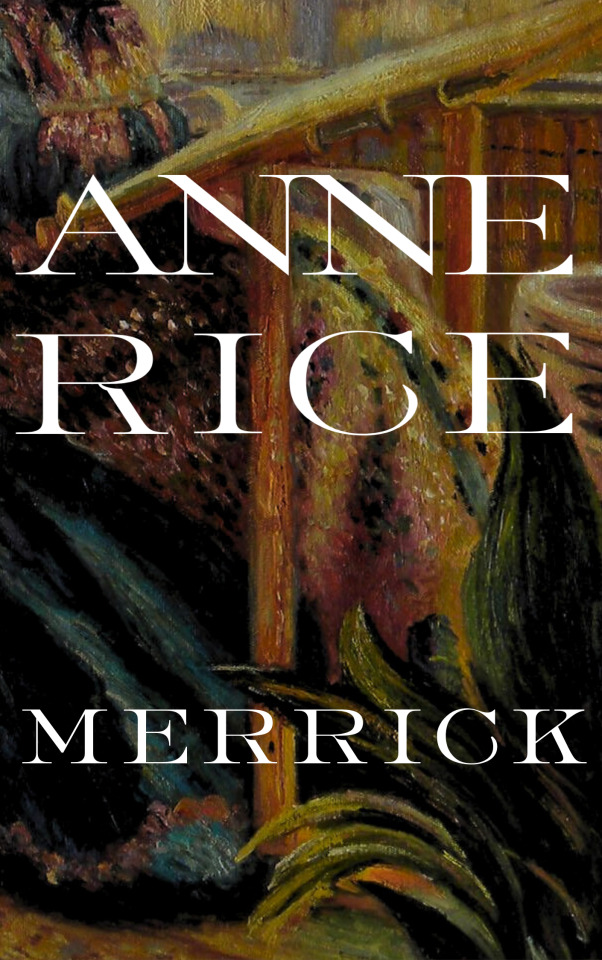
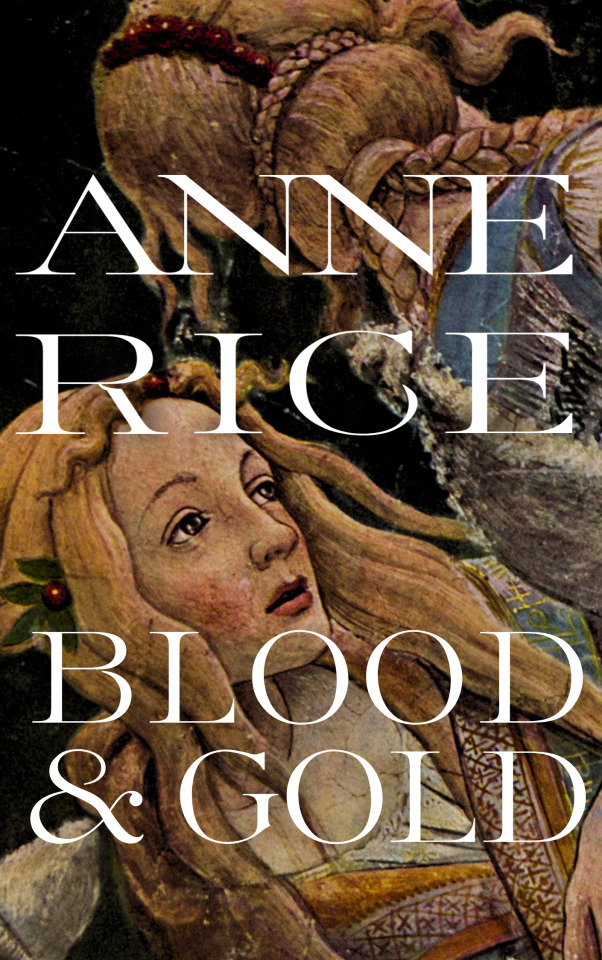
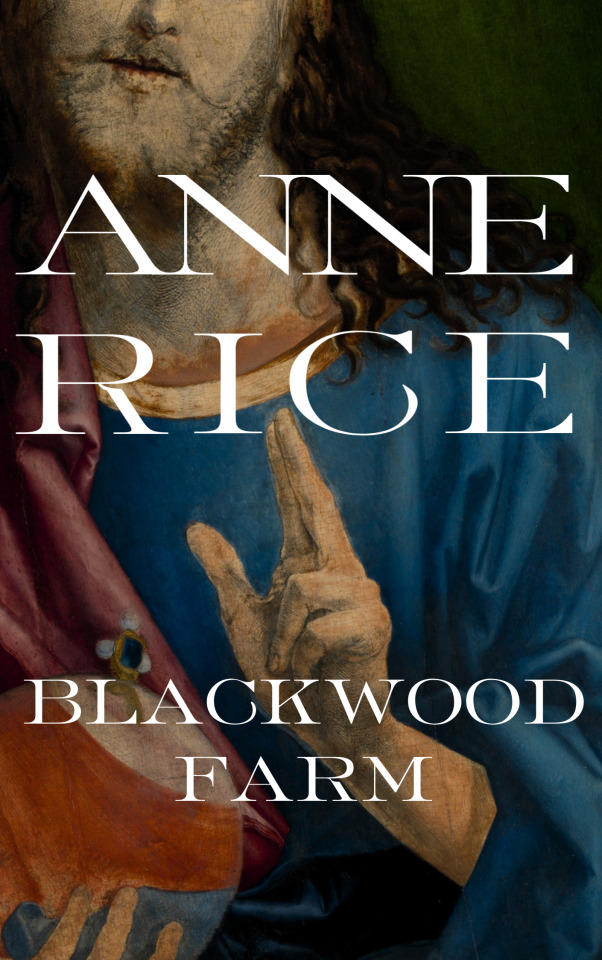


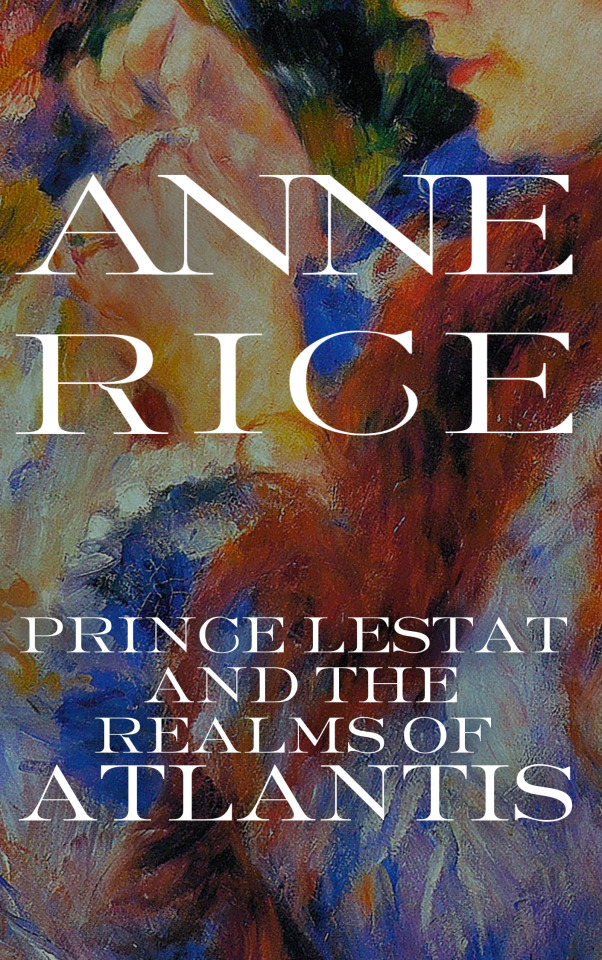

When I was making my other set of Vampire Chronicles ebook covers, I had another idea for a set inspired by my favorite of the original hardback covers: The Vampire Armand. The Vampire Armand cover isn't just well designed, it's also a specific painting referenced within the book, so I wanted to see if I could make covers with a similar design that also met that criteria for the other books!
As before, my disclaimer is that I am not a graphic designer, I am a nerd with a hobby! I don't own the rights to any of these books, images, or paintings (and I believe they are all out of copyright). I hope you like them!
See below for what each painting is, and a few notes about why I chose it and where it appears in the book:
Interview with the Vampire
Painting: Witches Sabbath by Francisco de Goya
Source: Directly Described, Artist Name Provided in The Vampire Lestat
Quote: "I kept looking at Claudia, the way she lay against the books, the way she sat amongst the objects of the desk, the polished white skull, the candle-holder, the open parchment book whose hand-painted script gleamed in the light; and then above her there emerged into focus the lacquered and shimmering painting of a medieval devil, horned and hoofed, his bestial figure looming over a coven of worshipping witches."
Notes: In The Vampire Lestat, Lestat specifically references that Armand's cell contains copies of paintings by de Goya. There are two different de Goya paintings of a horned devil, I believe this one is the one described here.
The Vampire Lestat
Painting: Amor Vincit Omnia by Caravaggio.
Source: Subject Referenced with Artist Name
Quote: "He moved into the glow of the candles on the side altar. His clothes were black velvet, once beautiful, and now eaten away by time, and crusted with dirt. But his face was shining white, and perfect, the countenance of a god it seemed, a Cupid out of Caravaggio, seductive yet ethereal, with auburn hair and dark brown eyes."
Notes: Armand is repeatedly compared to Cupid as painted by Caravaggio in The Vampire Lestat, and this painting is of that figure. Lestat also references Gabrielle having copies of Caravaggio paintings in her rooms at his childhood home. This painting actually has scattered sheet music and a violin lying in the corner, which was another section I considered using to represent this book.
The Queen of the Damned
Painting: The Dionysian Friezes of The Villa of the Mysteries
Source: Directly Described
Quote: "Then the realization had come to Daniel as they stood together in the ruined dining room with its famous murals of ritual flagellation barely visible in the dark: He isn’t going to kill me after all. He isn’t going to do it. Of course he won’t make me what he is, but he isn’t going to kill me. The dance will not end like that."
The Tale of the Body Thief
Painting: Syndics of the Drapers' Guild by Rembrandt
Source: Directly Described, Including Artist Name, Discussed by Characters
Quote: "Finally, a week after my arrival, I found David in the empty Rijksmuseum, just after sunset, sitting on the bench before the great Rembrandt portrait of the Members of the Drapers' Guild"
Memnoch the Devil
Painting: Garden of Earthly Delights by Bosch
Source: Directly Discussed by Characters by Name
Quote: "Exactly, like Bosch's Garden of Earthly Delights, that kind of luscious sensuous paradise! Of course, I hadn't seen Bosch's painting yet in the Prado. But it was here in miniature in these books. Little figures frolicking beneath the abundant trees. Old Captain said, 'Garden of Eden imagery,' that it was very common. But two books full of it? No. This was different. I had to crack these books, get an absolutely clear translation of every word."
Pandora
Statue: Roman Depiction of Isis, Hadrian’s Villa, 117-138 AD Est
Source: Described
Quote: "My Isis had been Greco-Roman. Even her statue in the Roman Sanctuary had been clothed in a gorgeously draped Greek dress and her hair had been done softly in the old Greek style, with waves around her face. She had held her sistrum and an urn. She had been a Romanized goddess.
The Vampire Armand
Painting: Primavera by Botticelli
Source: Directly Referenced by Name
Quote: "Come on, somebody, tell me I make you think of Mercury chasing away the clouds in Botticelli's Primavera"
Note: This is, of course, the original hardback cover of The Vampire Armand, and the inspiration for the rest of this set. This is a remake to match the aspect ratio of the other images.
Vittorio, the Vampire
Painting: Annunciation with Two Kneeling Donors by Filippo Lippi
Source: Directly Named
Quote: "My father took me to see two more of his works, which were both paintings of the Annunciation… I had particularly enjoyed paintings of the Annunciation. Well, this last one I saw before I left Florence, done by Filippo sometime in the 1440s, was beyond anything I had beheld before. The angel was truly unearthly yet physically perfect. Its wings were made of peacock feathers."
Merrick
Painting: Madame Monet Embroidering (Camille au Metier) 1875 by Claude Monet
Source: Described, Artist Named
Quote: "I looked at a painting by Monet—one I'd come to neglect of late due to familiarity—a painting full of sunshine and greenery, of a woman at work on her needlepoint by a window under the limbs of delicate indoor trees. Like so many Impressionist paintings it was both highly intellectual, with its obvious brush strokes, and flagrantly domestic."
Note: This is a painting in the house on Rue Royale, which is one of Louis's Monet's, as he's referenced owning one or more of them frequently throughout the series.
Blood and Gold
Painting: Events of the life of Moses by Botticelli
Source: Directly Described, Artist Named.
Quote: "It didn't matter finally what these paintings meant. They filled me utterly. And in one, there were two maidens rendered so sensitively and yet so sensuously that I was amazed."
Note: Marius describes all three pieces by Botticelli in the Sistine Chapel over several pages, but the specific reference he makes that is quoted above is this painting, which is he compares to Pandora. Later he frequently compares Bianca to Botticelli's work, and I like the interpretation of this cover representing Bianca and Pandora.
Blackwood Farm
Painting: Salvador Mundi by Dürer
Source: Directly Discussed by Characters by Name
Quote: "'I'd save Dürer,' he said. 'Salvador Mundi--you know, the face of Christ with the hair parted in the middle.’"
Note: Many paintings get referenced throughout Blackwood Farm, though many of the artists are ones discussed in other books. Quinn's answer to the question he and Tommy are discussing (which one painting would you save) is a Madonna by either Fra Filippo Lippi or Botticelli, artists represented elsewhere in this set.
Blood Canticle
Painting: One of the "Unpainted pictures" by Emil Nolde
Source: Artist Referenced
Quote: "What the hallway needed was Emile Nolde. How could I get my hands on the German Expressionists?"
Note: Later in the book the other characters reference recently purchased paintings, and paintings with sailboats in them, though this specific painting is not mentioned. Other paintings in Rue Royale are described as "impressionist paintings" showing the sky, which are implied to be Louis's, and Lestat mentions them not being his personal preference.
Prince Lestat
Painting: Still Life with flowers by Rachel Ruysch
Source: Painting Described, See Notes
Quote: "What a pretty room, painted a cobalt blue and with bright white enameled moldings, and on the wall a brilliant painting of roses, wild, exploding roses against a backdrop of a darker blue."
Notes: This is a painting from Rose's bedroom, and Rose is described as having fond memories of visiting the Rijksmuseum. This specific painting is not referenced but matches the subject matter and description and is by a Dutch artist, contemporary of Rembrandt, who has similar works in the Rijksmuseum.
Prince Lestat and the Realms of Atlantis
Painting: Marie-Thérèse Durand-Ruel Sewing by Pierre Auguste Renoir
Source: Painting Described, See Notes
Quote: "A Chinese vase filled with fragrant leafy eucalyptus, and a small undoubtedly genuine French Impressionist painting on the wall of a woman in profile, a woman with long russet hair."
Notes: The description given of the painting above is not very specific, but Renoir frequently painted women with red hair, several of them in profile, and this painting is one of them.
Blood Communion:
Painting: Sunset (1872) by Camille Pissarro
Source: Painting Referenced, See Notes
Quote: "Well, Louis and I have been reunited a number of times, and this time around, at the Court in France, our reunion is enduring. He left that Impressionist painting behind at my request in our old flat in the Rue Royale, and now these miserable miscreants had senselessly destroyed it."
Notes: All I had to work with here was that it was an impressionist painting that was special to Louis, so I wanted to find something that fit the tone of Blood Communion and was of a sunrise or a sunset, which feels in character for Louis. This painting is also currently in a private collection.
#anne rice#the vampire chronicles#vampire chronicles#tvc#the vampire lestat#the vampire armand#interview with the vampire#the queen of the damned#the tale of the body thief#memnoch the devil#pandora#vittorio the vampire#merrick#blood and gold#blackwood farm#blood canticle#prince lestat#prince lestat and the realms of atlantis#blood communion#book cover design#stuff i (sizeofyoursoul) made
130 notes
·
View notes
Text
Technomancy: The Fusion Of Magick And Technology
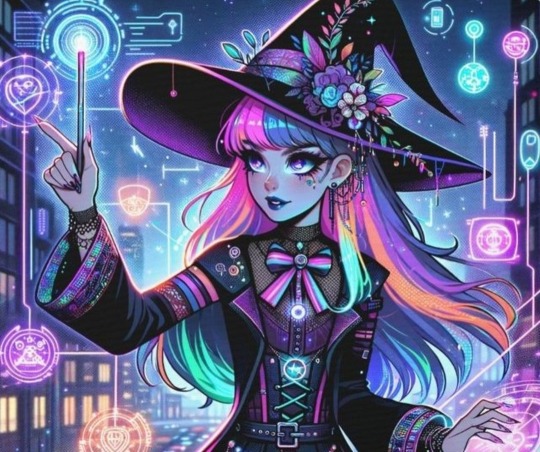
Technomancy is a modern magickal practice that blends traditional occultism with technology, treating digital and electronic tools as conduits for energy, intent, and manifestation. It views computers, networks, and even AI as extensions of magickal workings, enabling practitioners to weave spells, conduct divination, and manipulate digital reality through intention and programming.
Core Principles of Technomancy
• Energy in Technology – Just as crystals and herbs carry energy, so do electronic devices, circuits, and digital spaces.
• Code as Sigils – Programming languages can function as modern sigils, embedding intent into digital systems.
• Information as Magick – Data, algorithms, and network manipulation serve as powerful tools for shaping reality.
• Cyber-Spiritual Connection – The internet can act as an astral realm, a collective unconscious where digital entities, egregores, and thought-forms exist.
Technomantic Tools & Practices
Here are some methods commonly utilized in technomancy. Keep in mind, however, that like the internet itself, technomancy is full of untapped potential and mystery. Take the time to really explore the possibilities.
Digital Sigil Crafting
• Instead of drawing sigils on paper, create them using design software or ASCII art.
• Hide them in code, encrypt them in images, or upload them onto decentralized networks for long-term energy storage.
• Activate them by sharing online, embedding them in file metadata, or charging them with intention.
Algorithmic Spellcasting
• Use hashtags and search engine manipulation to spread energy and intent.
• Program bots or scripts that perform repetitive, symbolic tasks in alignment with your goals.
• Employ AI as a magickal assistant to generate sigils, divine meaning, or create thought-forms.
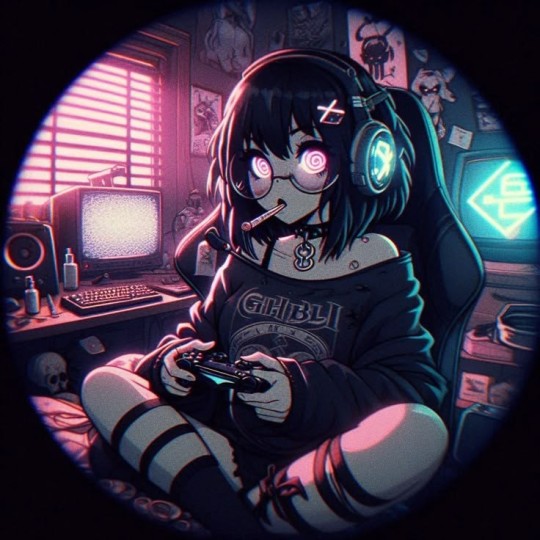
Digital Divination
• Utilize random number generators, AI chatbots, or procedural algorithms for prophecy and guidance.
• Perform digital bibliomancy by using search engines, shuffle functions, or Wikipedia’s “random article” feature.
• Use tarot or rune apps, but enhance them with personal energy by consecrating your device.
Technomantic Servitors & Egregores
• Create digital spirits, also called cyber servitors, to automate tasks, offer guidance, or serve as protectors.
• House them in AI chatbots, coded programs, or persistent internet entities like Twitter bots.
• Feed them with interactions, data input, or periodic updates to keep them strong.
The Internet as an Astral Plane
• Consider forums, wikis, and hidden parts of the web as realms where thought-forms and entities reside.
• Use VR and AR to create sacred spaces, temples, or digital altars.
• Engage in online rituals with other practitioners, synchronizing intent across the world.
Video-game Mechanics & Design
• Use in-game spells, rituals, and sigils that reflect real-world magickal practices.
• Implement a lunar cycle or planetary influences that affect gameplay (e.g., stronger spells during a Full Moon).
• Include divination tools like tarot cards, runes, or pendulums that give randomized yet meaningful responses.

Narrative & World-Building
• Create lore based on historical and modern magickal traditions, including witches, covens, and spirits.
• Include moral and ethical decisions related to magic use, reinforcing themes of balance and intent.
• Introduce NPCs or AI-guided entities that act as guides, mentors, or deities.
Virtual Rituals & Online Covens
• Design multiplayer or single-player rituals where players can collaborate in spellcasting.
• Implement altars or digital sacred spaces where users can meditate, leave offerings, or interact with spirits.
• Create augmented reality (AR) or virtual reality (VR) experiences that mimic real-world magickal practices.
Advanced Technomancy
The fusion of technology and magick is inevitable because both are fundamentally about shaping reality through will and intent. As humanity advances, our tools evolve alongside our spiritual practices, creating new ways to harness energy, manifest desires, and interact with unseen forces. Technology expands the reach and power of magick, while magick brings intention and meaning to the rapidly evolving digital landscape. As virtual reality, AI, and quantum computing continue to develop, the boundaries between the mystical and the technological will blur even further, proving that magick is not antiquated—it is adaptive, limitless, and inherently woven into human progress.

Cybersecurity & Warding
• Protect your digital presence as you would your home: use firewalls, encryption, and protective sigils in file metadata.
• Employ mirror spells in code to reflect negative energy or hacking attempts.
• Set up automated alerts as magickal wards, detecting and warning against digital threats.
Quantum & Chaos Magic in Technomancy
• Use quantum randomness (like random.org) in divination for pure chance-based outcomes.
• Implement chaos magick principles by using memes, viral content, or trend manipulation to manifest desired changes.
AI & Machine Learning as Oracles
• Use AI chatbots (eg GPT-based tools) as divination tools, asking for symbolic or metaphorical insights.
• Train AI models on occult texts to create personalized grimoires or channeled knowledge.
• Invoke "digital deities" formed from collective online energies, memes, or data streams.
Ethical Considerations in Technomancy
• Be mindful of digital karma—what you send out into the internet has a way of coming back.
• Respect privacy and ethical hacking principles; manipulation should align with your moral code.
• Use technomancy responsibly, balancing technological integration with real-world spiritual grounding.
As technology evolves, so will technomancy. With AI, VR, and blockchain shaping new realities, magick continues to find expression in digital spaces. Whether you are coding spells, summoning cyber servitors, or using algorithms to divine the future, technomancy offers limitless possibilities for modern witches, occultists, and digital mystics alike.
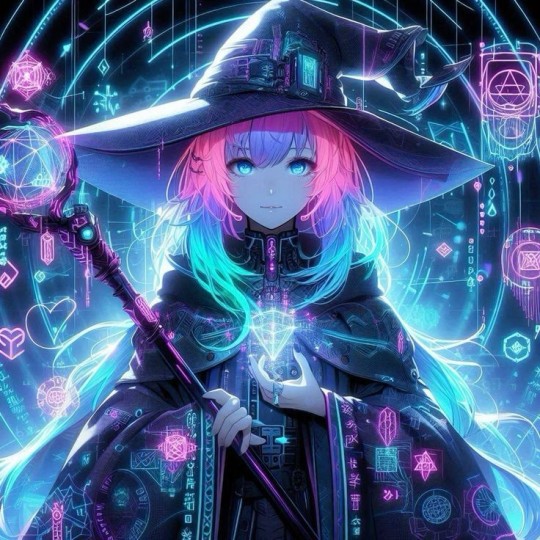
"Magick is technology we have yet to fully understand—why not merge the two?"
#tech witch#technomancy#technology#magick#chaos magick#witchcraft#witch#witchblr#witch community#spellwork#spellcasting#spells#spell#sigil work#sigil witch#sigil#servitor#egregore#divination#quantum computing#tech#internet#video games#ai#vr#artificial intelligence#virtual reality#eclectic witch#eclectic#pagan
89 notes
·
View notes
Text
I just came across a YouTube video complaining about the changes made to the musical of Wicked from the original book.
One of its main arguments is that in the musical, Glinda is too easily forgiven – both by Elphaba and by the show's narrative – for working with the Wizard, not to mention the other morally questionable things she does.
Now, I haven't read the book, or analyzed every word of the musical's script and lyrics, but I'm not sure if I agree with that claim or not.
I agree with what @cto10121 has written in the past, that maybe the musical focuses too much on Glinda when it's supposed to be Elphaba's story, but I don't think the show glosses over Glinda's flaws or bad decisions. I've always thought she was a very morally gray character who has a redemption arc in the end. And she most definitely pays a hard price for her mistakes, ending up in power but all alone on a personal level, thinking the two people she loved most are dead because of her.
But just from scrolling a little on both Tumblr and YouTube, I think the musical's fandom might idealize Glinda, whether the musical itself does or not. I don't know how widespread it is, but I've definitely felt as if the fandom idealizes her entire relationship with Elphaba, and they do leap to defend her whenever someone misguidedly calls her "the real wicked witch"... sometimes with defenses I don't buy.
Again, again, and again, I've heard people say "The message is that there are two sides to every story and no one is all good or all bad."
(Which of course is true to an extent, but which IMHO, paints false moral equivalency between Elphaba's side of the story and both Glinda's and the Wizard's.)
I've also seen "The whole point is that Elphaba starts out as the heroine while Glinda starts out as a mean girl, but Glinda becomes a better person while Elphaba becomes a worse person over the course of the story, until they become the characters we know from The Wizard of Oz. Ultimately Glinda is the more heroic one."
(That's... not quite the way I would describe their arcs.)
And, most thought-provokingly of all, I've seen this:
"Glinda deserves more respect for her intelligence. At first we're made to think she's a dumb blonde, but it turns out that she's very clever and shrewd, and her claim that a good image is what matters most in society turns out to be totally right. It's by working within the system and pleasing the Wizard and the people of Oz that Glinda gains power, which lets her oust the Wizard and Morrible in the end, while Elphaba's rebellion crashes and burns."
Even if part of the show's message is "Society values a good image more than real merit or truth," aren't we meant to view that fact as a bad thing that needs to change, rather than admiring Glinda for knowing it all along and benefitting from it?
This reminds me of commentary I've read about Amy March from Little Women. A character who has a lot in common with Glinda in some ways, though without the political aspect. I like Amy and I don't think she deserves the hate she traditionally gets from Jo fans, but some attempts to defend her annoy me. Namely the fans who praise her for conforming to society better than Jo does: i.e. "Amy is the smartest, most mature March sister because she knows how to please her social betters and make the system work in her favor – unlike Jo, whose rebellious ways get her nowhere and who needs to learn to be a proper docile lady for her own good." Again, I like Amy as a character, but as a neurodivergent feminist who relates to Jo's independence and her failure to conform, I don't like that talk.
And Amy doesn't serve a fascist regime.
I'd like to know what bigger Wicked fans than I am think of all this. Does the show absolve Glinda too much, or if not, does the fandom? Or do both the show and fandom have a more-or-less accurate view of both her flaws and her virtues?
56 notes
·
View notes
Text
the fact that in the original script Qetsiyah was murdered by her brother after finding out what she had done…and then Qetsiyah developed a relationship with the travelers when it would’ve made sense if the travelers were just scorned Bennett witches (who left the coven…) if someone is going to sudden rid the town of magic… I’d see it being pissed off Bennetts before this random subsection of witches cause who tf is Markos.
Image here for context:
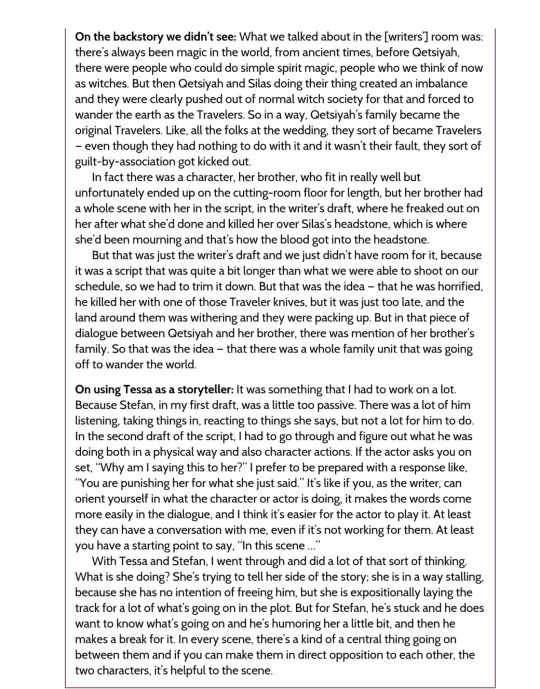
Instead, fleshing Qetsiyah out they turned her into a prop for another doppelgänger love story…. Like here to read the rest.
#qetsiyah#oh my girl you were insane as hell but disrespected#tvd#the vampire diaries#bonnie bennett
34 notes
·
View notes
Text

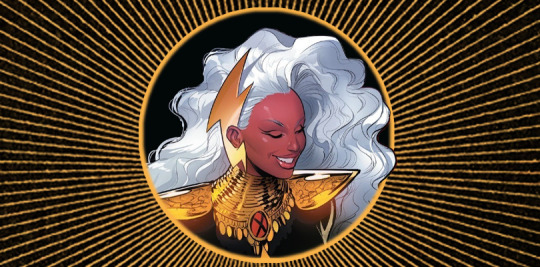
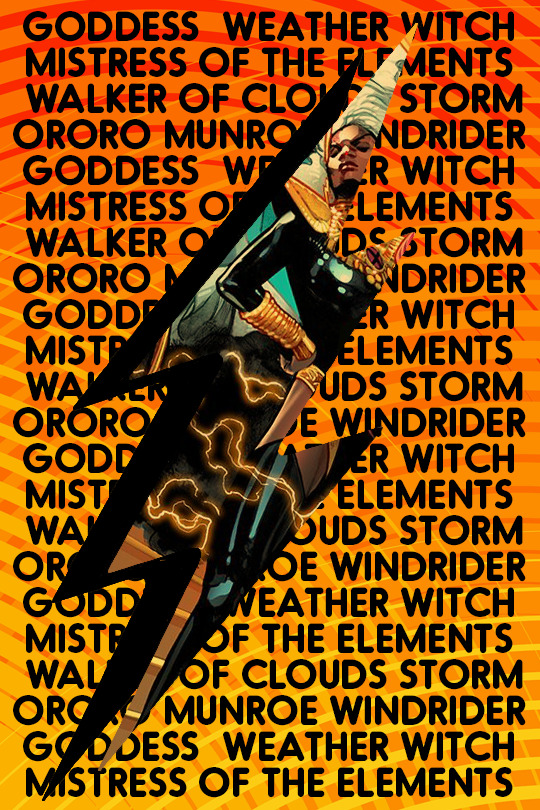
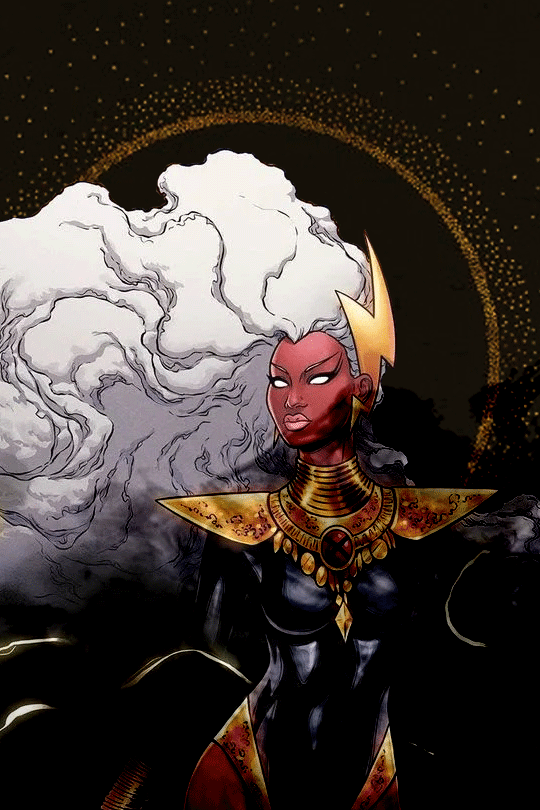
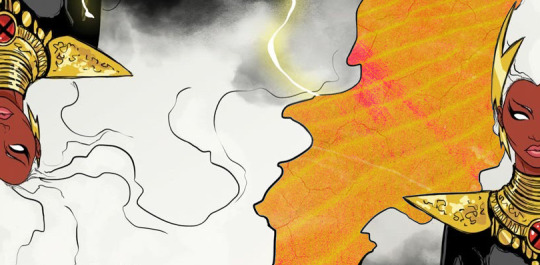
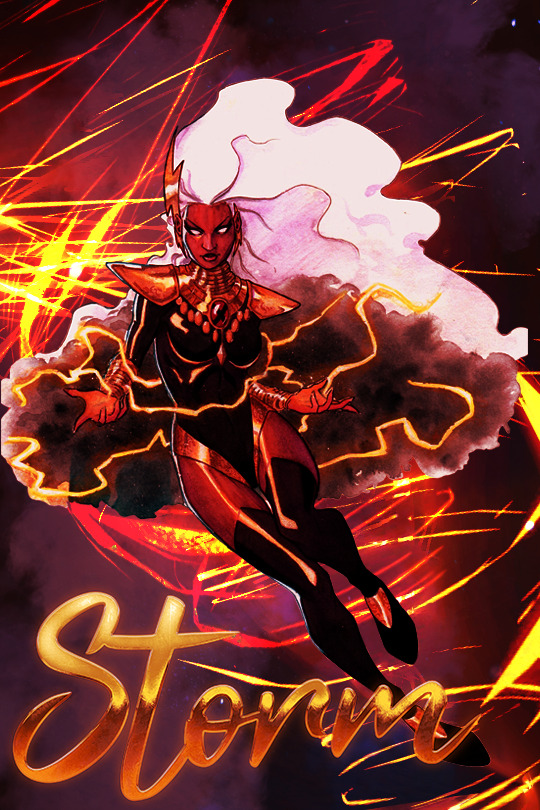
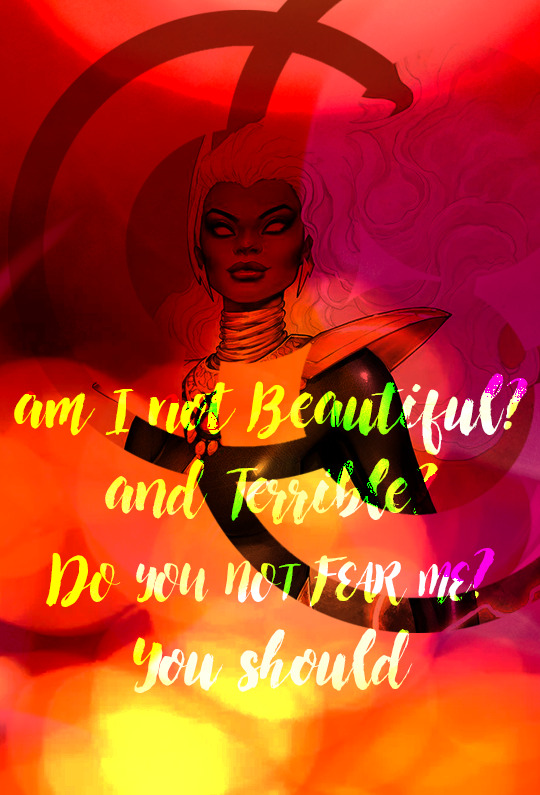
Let me feel your light Let me speak your name Goddess of the night Goddess of the rain
Art: Russell Dauterman, Rafael Domingues, David Nakayama Lyrics: Goddess of the Rain - Burn the Ballroom
ID below the cut
[ID: A series of comic edits featuring Ororo Munroe in her Hellfire Gala outfit, (black bodysuit, gold necklace, gold bracelets, hair a white cloud, black boots, lightning bolt earrings, lightning bolt hair piece) with a focus on colors of orange, black, red, yellow, and gold; Edit 1 - Ororo looks off into the distance while using her powers of electricity, a flashing gif of lighting overlays the edit with the words written in small white letters; you spoke once of power. you do not know the meaning of the word. I will show you power. Edit 2 - Ororo smiles while her head and shoulders are encircled in a shining golden sun with black background. Edit 3 - orange, red, yellow stiped background with the words of; goddess, weather witch, mistress of the elements, walker of clouds, storm, ororo munroe, windrider repeat under the image of ororo in a lighting bolt cut out. Edit 4 - Ororo stands and looks off into the distance, her eyes are pure white while smoky black clouds move around her in a animated gif with a gold flecked black background. Edit 5 - two halves of Ororo's face are on opposite sides of the edit with one being upside down over a yellow/orange background. Edit 6 - Ororo is flying through the air while using her powers set over a background of a tornado made of light with her name, Storm, in gold script. Edit 7 - Ororo looks out at the viewer in a haze of circles and light in red, yellow, and orange. The words "am I not Beautiful? and Terrible? Do you not fear me? you should" are scrawled across in light yellow coloring. [/End ID]
#ororo munroe#storm#ororomunroesource#hellfire gala#comicedit#image described#cw: flashing gif#cw: eye strain#impedit#she's the love of my life your honor
441 notes
·
View notes
Text
The Arms of Night
In "The Summoning," The Lords in Black say "us spawn of the Black and White cover our souls in robes of black and take up the arms of night." This sounds like them describing the ritual of holding court with the void from their perspective, so what are "the arms of night?"
I've noticed that each of the LiB has a specific powerful object associated with them, and my theory is that these objects are collectively referred to as "The Arms of Night."
Some are obvious, such as The Bastard's Box, which is Tinky's.
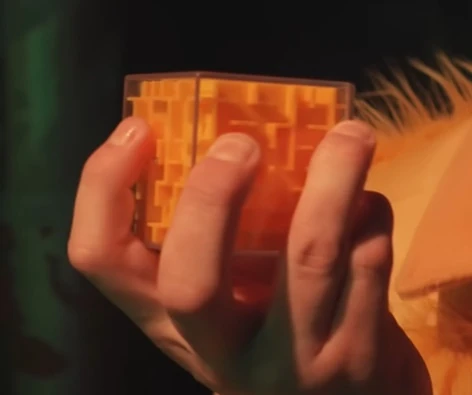
The Black Blade is likely Wiggly's due to the fact that Wilbur Cross attempts to use it in The Witch in the Web, and the fact that the LiB's formation in the lower image mirrors their formation in "The Summoning."
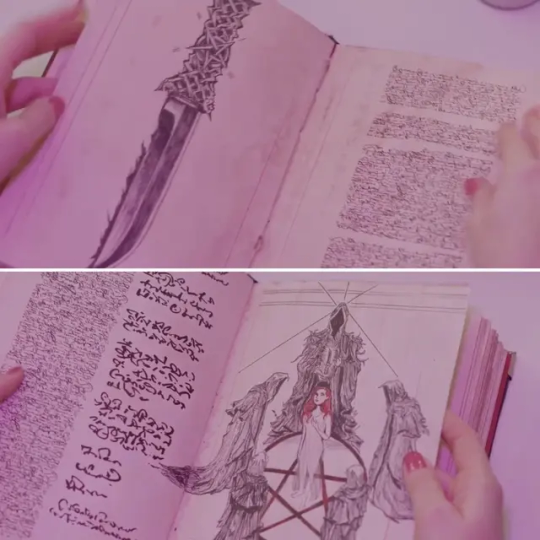
We start to get into more speculative territory with the other Lords, but it's interesting that Pokey takes off his mask for this scene, showing that it's an object, rather than a part of his biology. I think the mask is Pokey's Arm of Night.

Blinky is not carrying any objects during "The Summoning." However, a mallet is used as a weapon several times throughout Watcher World. I think that mallet is Blinky's Arm of Night. Blinky clearly takes particular delight in watching people torment each other, which he manipulates them into rather than causing the torment himself. Therefore, it's only fitting that Blinky's Arm of Night would only ever be wielded by others on his behalf. Plus, the mallet is described in all caps in the official script for that episode:


Finally, I think Nibbly's Arm of Night is the giant lollipop. I'm not sure yet what it does, but I am sure it's something sinister.

#starkid#hatchetfield#nightmare time#watcher world#time bastard#the witch in the web#nerdy prudes must die#npmd
32 notes
·
View notes
Text
☆☆ FAME DR ☆☆
So i wanted to do kinda of a introduction to some of the characters i have scripted so far to Evie Valentine. Some of them are more thought out than others as you will notice.
They are organized by chronological order
The Coven (1999-2005)
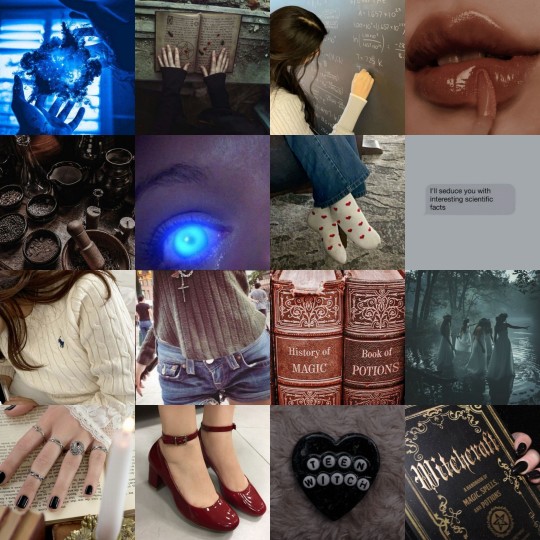
(Original TV show i imagined)
After the Vital family moves to a small town,Elisa Vital the family’s 16-year-old daughter, develops a new ability, makes new friends and enters a teenagers witch coven.
Kassidy Welser is a smart and knowledgeable girl. In the coven she is a Illusion witch, which allows her to create large scale illusions to convince a lot of people at the same time and individual illusion who trick one person at a time. Depending on her skill level the illusions become more realistic who eventually becomes tactile.
I'm on every season as a Ensemble Character
X-Men movies (2000,2003 and 2006)
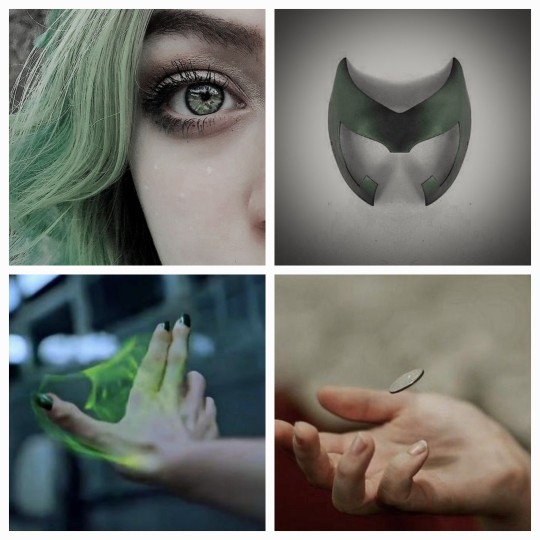
I still haven't decided on how much of the mivies plot change with Polaris there but i'm thinking of something around changing teams from Magneto's to the X-Men in the last movie.
Not A Love Story (2001)
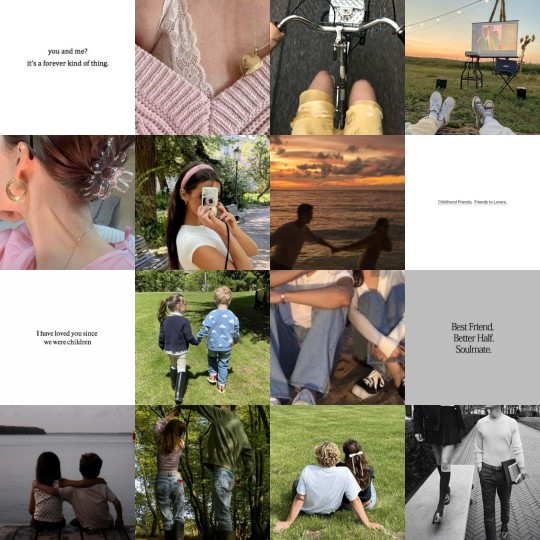
( Original Movie i imagined)
Allison Scott and Charles Smith have been best friends since childhood. After they graduate High School, their parents try to make them fall in love before they move out of state for different colleges.
I play the main character Allison Scott
One Tree Hill (2003-2012)

After her parents death Penelope “Poppy” O’Malley and her sister Melody are welcomed in Tree Hill by her father’s old friend Dan Scott.
Poppy is a stubborn and spontaneous girl with a rebellious streak. Soon after settling herself in the Scott’s house she begins a friendship with Lucas Scott and his friend group. She has a brief casual relationship with Lucas for the first two seasons and later a unrequited crush on Skills.
I'm on every season as a Recurring Character
Supernatural (2005-2020)
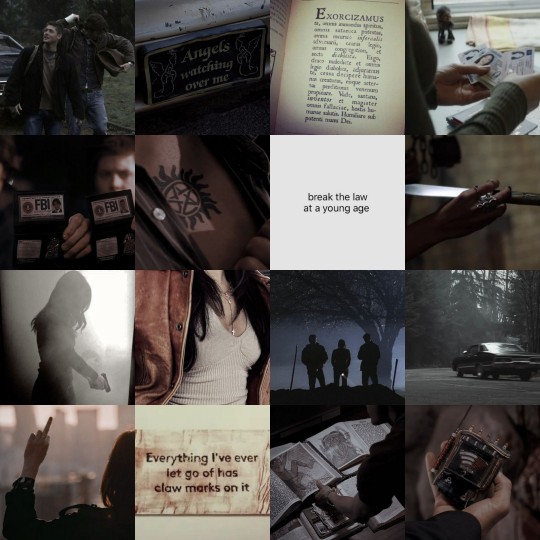
Christina “Chrissy” Allen is a hunter friend of Dean Winchester, they met while Sam was at Stanford. She is cunning and extremely talented with blades and has a variety of knowledge with the occult. She has a turbulent romantic relationship with Sam Winchester.
Recurring Character (Season 1-6) -> 2005-2010
Ensemble Character (Season 10-15) -> 2015-2020
Criminal Minds (2005-2025)
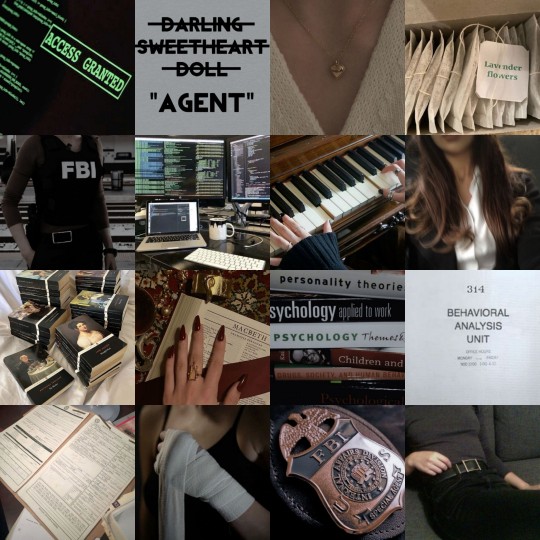
Genevieve “Jenny” Hill is part of the Cyber crimes division of the B.A.U. She is a pacifist with a love of classic literature. She has a romance with Dr. Spencer Reid
I'm a Recurring Character for seasons 6 and 7 and a special guest star in the other seasons for when os relevant to mention Reid's girlfriend (and yes i did script a Spin-off. What can i say i love creating Spin- offs so i can be the main character)
(All images found on Pinterest)
#Evie Valentine#dr filmography#fame dr#actress dr#shiftblr#shifters#anti shifters dni#shifting diary#shifting script#shifting to desired reality#shifting consciousness#reality shifting#shifting community#reality shifter#shifter#shifting realities#desired reality
30 notes
·
View notes
Text
What Oz could have been: the 1939 movie
Last time I talked about what Disney's "Oz: The Great and Powerful" would have originally looked like, based on the first version of the script. But today I want to talk about THE big Oz movie, THE classic: the 1939 MGM movie.

Everybody knows this picture, it became iconic and cult, and is such a big part of culture today... Yet, you might be surprised to learn that the movie could have ended up looking VERY different from the one we know today.
Indeed, the "Wizard of Oz" script kept being written and re-written and re-re-written by a dozen of different authors and co-authors, to the point that when it came time to credit who was behind the script problems arose to find an exact name to put on there... If you want to know the detail: a first draft was by William H. Cannon, Mervyn LeRoy's assistant, before the contracts were set and when everything was just beginning. Once the project started, the first full scenario was written by Irving Brecher, but he was then overtaken by another project and replaced by Herman J. Mankiewicz, who worked for one month over the script until a co-author arrived in the form of Ogden Nash. Then a third author joined the team: Noel Langley (he was the one who had the idea of changing the Silver Slippers in Ruby Slippers, and he brought the idea that the three Oz companions would have counterparts as farm helpers in Kansas). HOWEVER Mankiewicz ended up quitting the team. He was replaced by Herbert Fields, who only stayed for three days and didn't change anything, before being also replaced by Samuel Hoffenstein, who also only stayed for a few days without modifying much (or anything). FINALLY Noel Langley gave back the final product of the writers' team... Which of course was edited, rewriten and modified by a second team, formed of Florence Ryerson and Edgar Allan Woolf. They were then brutally moved to another movie, and the script returned into the hands of Noel Langley to be again rewriten and adapted. One month before the movie started Noel Langley was given another co-author, Jack Mintz, and the second "final" scenario was delivered... Before being corrected and modified by a new author recently brought by Victor Fleming, John Lee Mahin. And THEN it was done!
Of the fourteen different authors that worked on the script, only three ended up being given credit in the final picture: Noel Langley, Florence Ryerson, and Edgar Allan Woolf.
The result was a project that varied wildly in production. In fact, while the final movie is still vaguely faithful though a bit loose adaptation of the original novel - the very first drafts of the movie had NOTHING to do with the original novel. The "faithfulness" to Baum's Wizard of Oz can be considered almost an accident as each rewrite got closer to Baum's story, only in an effort to get away from the older script... Anyway, here are some highlights and best-offs of the Oz movie we could have had:

The MGM movie has a lot of deleted scenes and songs, that were recorded but not included in the movie. Hopefully a lot of them were released online and can be easily found on Youtube, or elsewhere on the Internet. Most of them were cool reprises that were cut short for time: for example the song "The Wicked Witch is Dead" had a reprise after the death of the Witch of the West, sung first by the Winkies Guards and then morphing into the song being sung by the Emerald City denizens (fragments of this reprise were still used in trailers for the movie). There is also the very famous "Over the Rainbow" reprise that a scared, crying Dorothy was to sing while trapped in the Witch of the West's castle, before the Witch taunted her with an image of Aunt Em in the crystal ball. The reprise is REALLY touching and Judy Garland really put her best in there. There are also alternate takes which reveal a lot about what the movie was intended to be - for example we have alternate records of the "Lollypop Guild" which shows that the high-pitched voice of the final movie was actually an intent to create a "little boys" voice, to match the little girls of the Lullaby League.
The most famous of all these deleted songs is without a doubt the "Jitterbug" song. It was only cut at the last minute, and this brutal removal leaves bizarre remnants in the final movie (for example the Witch says she "sent a bug" to take care of Dorothy and her friends ; and when the Flying Monkey arrive they look sweating and exhausted). This was because originally the Wicked Witch of the West was supposed to send to the heroic party a magical bug (the titular "Jitterbug") that would have forced them to dance until exhaustion, so the Winged Monkeys could easily pick them up. This was however removed out of fear this would date the movie, and they were very much right... Because the entire pun on which the scene relies does not work anymore today: the "Jitterbug" being a specific style of dance very popular in the 1930s and 1940s, but that stopped existing beyond the 1960s. However the "Jitterbug song" earned enough of a fame to get included into the recent "Tom and Jerry" animated movie of "The Wizard of Oz".
Originally, a child-actress was envisioned for Dorothy, and the first choice was Shirley Temple. She declined (but she would later play the role of Tip/Ozma in a Marvelous Land of Oz production). When Judy Garland was cast, there were attempts at giving her a makeup that would make her look more like a child - but everybody pointed out it made her into a ridiculous "baby doll". The first plans were also to have Dorothy be blond, as she was in later Oz books.

Everybody knows the iconic, creepy look of the Wicked Witch of the West, but did you know she was supposed to be... beautiful? One of the main and biggest inspirations for the MGM movie was the huge success of Disney's Snow-White and the Seven Dwarfs. Since they attempt to recreate it, their original plan for the Wicked Witch of the West was to have her be a beautiful villainess evoking the Evil Queen of Disney. The original actres cast for this "glamorous witch" was Gale Sondergaar, and we still have shots of her in costume. However it was later decided to make the witch into an uglier, more grotesque character evoking a traditional fairytale hag. Mervy LeRoy was the one who wanted to have the "glamorous, sexy" witch but many (among which Arthur Freed) defended the idea that the witch had to be like Disney's old crone, not evil queen... So they decided to recast the role - leading to the arrival of the one of a kind Margaret Hamilton.
Speaking of the Wicked Wich: One of the original plans for the character was to have her be the Oz counterpart of... Aunt Em. Indeed, no Miss Gulch of any kind. Early on, Aunt Em was considered to be a meaner and colder caretaker to Dorothy, and the one who wanted to get rid of Toto - which explains why she became the Wicked Witch of Oz. (This idea was by Langley, the one who also had the idea of making Dorothy's companions into the farm-helps of Kansas) The Wicked Witch also had a son, Bulbo, an ugly and dim-witted man she wanted to make King of Oz, and who was... the counterpart of Uncle Henry. Later, when the character of Miss Gulch was created, she was given a son named Walter to match Bulbo, before the character was scrapped altogether.
The Jitterbug scene was actually a left-over of a much earlier version of the movie which would have put a strong emphasis on the "musical aspect". This version wanted Oz to be under the tyranny of a spoiled brat of a princess that would have outlawed all forms of music that were not classical music and opera ; young and hip Dorothy, however, would have brought the swing and the jazz from the 1930s USA and used it to win over the princess in a singing duel, and becoming a hero in Oz. Who would have played the princess? I had conflicting reports: some say Deanna Durbin (one of the early candidates for playing Dorothy, alongside Shirley Temple) was considered for the role ; others said it would have been Betty Jaynes playing a certan "Princess Betty".

The earliest version of the script we have (created by William H. Cannon) was heavily inspired by the 1925's Wizard of Oz movie (because yes, there were Wizard of Oz movies before the MGM one), and wanted to remove all forms of magic and supernatural from the story. The brainless scarecrow would have been a man so dumb the only job he could find was to scare crows in fields ; the Tin Man was supposed to be a heartless criminal that the law had forced to wear a suit of tin as a punishment, punishment which did encourage him to learn kindness...
Oh yes, everybody noted in the final movie how Dorothy favorizes the Scarecrow above the other companions. This is a remnant of the scenario drafts wher the final scene of the movie would have been the teary farewell of Dorothy to Hunk, as he leaves for agricultural college and she promises him to write him every day - implying a romance between the two...
People might note a bizarre editing during the scene of the companions freeing Dorothy - such as the door being axed down not corresponding to the door the group escapes from. This is due to yet another cut sequence: the door the companions axed down was to be a trap by the Wicked Witch, who was to imitate Dorothy's voice and song to lure the companions. Once she had captured the three friends, she would have used them as baits, forcing them to call out for Dorothy and to encourag her to take a magical "rainbow bridge" that appeared out of nowhere... Except said bridge would have been created by the Wicked Witch's magic, and while the rainbow was solid enough to walk onto for a certan distance, at one point it returned to being just light. The Witch hoped to kill Dorothy by doing this - but didn't count on the Ruby Slippers' magic actually preventing Dorothy from falling through the rainbow.
Before it was decided to have Glinda send snow to kill the cursed poppies, the original concept was that the Tin Man's tears would have awakened Dorothy (an idea that, as people pointed out, was reused in "The Wiz").

There was at one point plans for the Cowardly Lion to actually be just a... a regular lion that tagged along as a sort of pet with the team, and had dubbed lines, to be revealed as "Prince Florizel", a Prince Charming-type of character that had been cursed under the shape of a lion, and would in the end have married his lover, princess Sylvia (this version was one of Noel Langley's, and very influenced by traditional fairytales). This version most notably pushed Dorothy into being a secondary character: it was the Prince/Lion who was to kill the Witch, by somehow cutting her broom so it would fall into pieces while in the air. There was also a dragon the prince was supposed to fight. This version, being Langley's, was the one that included the Witch having a son (see above). In the older versions of this story, the Witch's plan to make Bulbo king of Oz was to have him marry princess Sylvia, heir to the Ozian throne (hence why Florizel's feud with the Witch is personal) ; later it was changed to the Witch planning to attack the Emerald City and dethrone the Wizard with an army of men, wolves and winged monkeys.
When the MGM learned that Disney was working on their own adaptation of the Wizard of Oz back then, there were brief talks of the two studios uniting their efforts to make a half-live-action, half-animated movie.
During the scene where the Wicked Witch threatens the companions at the cottage in the forest, the Witch was supposed to threaten the Tin Man by briefly turning him into a "beehive", aka filling him with bees, and after crushing one of the insects the Tin Man would have cried, causing his jaw to rust and be blocked.
Early on, there were plans to keep Oz as an actual magical place that truly existed - but the movie-makers of the time considered fantasy was not "sophisticated" and "serious" enough for the audiences, and so they added the entire idea of Oz being shown as a dream-world so adults could "buy" the movie.
#what oz could have been#the wizard of oz#1939 wizard of oz#mgm wizard of oz#oz#wizard of oz#deleted scenes#what could have been
58 notes
·
View notes
Text


THE WITCH'S SONG - part two knight!osamu/witch!reader tags: fem!reader, royalty!au, supernatural!au, witchcraft, enemies to lovers, mentions of violence/illness/death, persecution and oppression, tw blood/gore, please read the tags on each chapter as updated and minors do not interact. crossposted to ao3 MASTERLIST

For as long as you can remember, you have always risen with the sun.
It’s a habit so deeply constitutional that you've never bothered to question that part of your own nature—the breaking light cresting over the horizon each day, perfectly in time with the first flutter of your eyelids.
Your bedsheets are gentle against your skin as you rouse from your slumber. They're buttery soft, perfectly worn-in from the many nights of rest you’ve found under their cover, and the scent of fresh air still clings to them from an afternoon spent hanging on your clothesline a few days prior. You nestle your cheek into the downy embrace of your pillow, breathing in deeply to savour those lingering notes of summer breeze. You let the breath fill every corner of your chest as you inhale, feeling the way your ribs rise to make room for it, and then you let it out again in a warm rush. You repeat the cycle a few times more, and slowly take in the first moments of your day as your eyes adjust to the early morning light.
With your your arm crooked at your elbow, your hand sweeps lazily around beneath your pillow. You search blindly for a moment, unhurried but sure, and then your fingers brush against something solid and cool hidden away under the feathery mass. You wrap your fingers around the object and draw it out, holding it up above your face to appraise it.
It’s a pair of silver scissors, with a sprig of dried lavender fastened to them beneath a thrice-knotted length of thin white twine.
Outside your window, the milky indigo sky provides very little light. The distant sun is still only a sliver of light peeking out over the eastward sea, but what little glow the new dawn provides catches in the scissors's polished silver surface. You see the distorted image of your own eye, just a glimpse reflected along the narrow blade, staring back.
Sleep does not come to you peacefully, and it hasn’t for a long time. It seems to fight you, tooth and nail, each night, but the battle is ever-changing. Sometimes sleep evades you completely, leaving you to toss and turn restlessly until the moon disappears and the day starts anew. Other nights, slumber overtakes you quickly, but its true violence strikes when you’re left at your most vulnerable—nightmares whose claws sink themselves so deep into you, you can still feel their phantom pain long after you tear yourself awake in a cold, trembling sweat.
Your fingers tighten around the scissors in your grip—still cool to the touch, as though your body heat cannot warm them.
The scissors are a simple charm to keep away terrors that might creep in while you sleep. Just like them, the collection of carefully crafted and curated trinkets that surround your room—dried flowers, jagged crystals, hand drawn sigils inked upon slips of silk and parchment—are all kept in an effort to rest peacefully. To ward away anything that may prevent it.
You didn’t always have so many.
You didn’t always need them.
These items are tacked to your walls, line your windowsills, and hang from the tall posters of your bed—each and every one a remedy originating from a carefully documented entry in your mother’s grimoire. The massive tome rests presently at the foot of your bed, tangled in your quilt. You often fall asleep—as you had the night prior—poring over the parchment pages, bound in strong leather tanned a deep midnight blue, filled with a familiar sloping script that makes your heart ache. Her life’s work and story, her own magic and every piece of knowledge ever shared with her, is contained within those precious pages.
It’s one of the last parts of her that remains.
Thankfully your mother's charms served you well throughout the night, as you feel relatively well rested as you rise from your bed—pulling a housecoat on atop your poplin nightdress and stretching your arms up over your head to welcome the day. You tug your quilt up to meet your pillows, tucking it in neatly at the corners, and then you close the heavy cover of the grimoire that rests at the mattress’s edge. You let your fingers trace lightly over the embossing on the cover as you appreciate it, and then you slip it safely into the trunk at the end of your bed where it belongs.
You’re a little surprised that your visitor from the night before hadn’t caused more of a disturbance to your sleep, already so capricious, particularly given the terrible sense of foreboding that had been hanging over your cottage in the days leading up to his arrival—like a heavy, briny fog rolls in from the sea. You choose not to question good fortune, at least not so early in the day—shaking your head as if willing the unwelcome thought away—and you set about your usual morning routine as though nothing in the width of the world is different than it has been any day prior.
You wash, prepare a light meal, and dress yourself in simple attire suitable for a day’s labour, all before the sun has fully risen from the cradle of the horizon. You plan to work in the garden again today, tending to your plants with the meticulous care they require. You aim to start early in hopes of completing the task before the hottest part of the day makes the work less pleasant—the air at dusk the night before had smelled so sweet, a faithful harbinger of a sunny day ahead.
The grass still glimmers with dew as you step outside your cottage, breathing in the clean, crisp air. Across your property, the sun is just about to creep up over the sea, though there’s a lilac brume that cloaks it—a gentle shroud that lets you see her shape without straining your eyes. You keep your feet bare as you tread towards the garden, listening to distant birdsong, and the blades of dew-damp grass kiss against your soles with every step.
You pause at the break in the wall that surrounds your cottage, the threshold between your garden and your home, and take a deep breath in. The wind kisses your cheek as a breeze rushes past, and the plants rustle around you as if bidding you good morning. On your exhale, you breathe the greeting back.
The light continues to rise in the sky as you labour, soon burning off the gossamer mist that tends to linger early in the morning until the day is bright and warm and fully underway. You shuck the knitted sweater you’d worn out at dawn as the temperature climbs with the sun, and eventually cuff your trousers at the ankles too, but you pay little attention to the heat of the day as you go about making sure your plants are watered, pruned, and any that require special attention are given what they need.
You sing softly while you work.
Witches have long sung songs while they toiled, or gathered together, or just as a means to pass the time. It's a cherished tradition among your kind, and you were taught when you were very young that a witch’s song is a sacred, honoured thing—her voice a gift and a powerful tool.
You don’t sing as much as you ought to, nor as loudly. Perhaps, not least of all, because there’s no one there for you to sing to save for your budding rows of plants. Some of y our earliest memories, the ones hazy at the edges as they’ve been eaten away by time, are of your mother singing in her own garden at the house that you were born in.
Why do you sing to them, mother?
On the edge of a northern breeze, you can hear your own voice—higher, lighter, happier than what it grew to be. You squint up into the midday sun as you reflect.
So they can remember us, Button.
Button.
She called you that because you were always losing yours when you were young; returning to the little cabin you called home at the end of the day with dirty knees, pockets full of shiny rocks, a handful of berries to share with her before dinner, and with one less button on your dress than you’d set off into the woods with that morning.
You remember her impossibly soft hands patting over your head, your arms, your legs, as she appraised you for any bumps or bruises. You remember her breathy laugh as you told her your scrapes and nettle stings didn’t even hurt. You remember her gentle eyes, always sparkling like she was telling you a secret.
Don’t you like when I sing to you? Doesn’t it make you happy?
Your little ribbon-haired head couldn’t have been quicker to nod if you’d tried—your answer to her question came immediate and fervent. Your mother's voice was your most favourite thing.
Well, it makes the plants happy, too—and that happiness will help them grow. Their roots will dig down deep into the earth, and they’ll take all our stories that I sing to them there, too.
You recall the childhood fantasy of each word of your mother’s song spelled out in sprawling, knobbly roots, hidden underground, being kept safe by the earth.
Your eyes flutter shut, blocking out the sun and trapping in the fleeting memory.
The songs she sang to you, the stories that she told, the grimoire in the truck at the end of your bed. Those are all that you have left of her now. You keep them safe just like the soil covered up the roots.
Since time immemorial, song has been used to pass tradition from one generation of witches to the next—the legends of your people, the same ones you recite now as you snip the reedy leaves away from your precious plants, were all taught to you in verse and chorus.
Men flock to the melody of the witch’s song like moth to flame. To hear it is to be bewitched by it. Your mother warned you of such a thing, in the same way all young witches are, and of what might happen should your song be overheard.
The history of man calls the witches temptresses, because of their own weakness to their song. Sirens. Man-eaters. That’s how they choose to remember it in their own egocentric folklore; the witch's song is a weapon used to ensnare them, and nothing more. They hide their own antecedent failings by laying blame, and burning any testament that remembers it otherwise.
You've known one truth as long as you've known anything: men are gluttonous, self-serving beasts. They see the world solely as it relates to themselves. They'll take anything in which they see beauty. And they'll immortalize their story, inked in your kind's blood, only as seen through their own eyes.
But the witch’s song was never meant for man.
You pause, your eyes still tightly closed, with your face turned up towards the sun.
Miya Osamu is standing at the forest’s edge.
You know he’s there even without opening your eyes, but when you eventually do, your sight immediately catches on the glint of the polished sword hilt at his waist.
He’s come armed today.
It’s noon on the day following his unceremonious arrival—the one where you had warned him, at risk of his own life, not ever to return. You know it’s noon, or very near to it, because the sun sits at its highest point in the clear midday sky as he emerges from the thicket of the wild, towering woods at the edge of your property.
For a moment upon seeing him, you wonder if you ought to flee—if you should seek shelter on the other side of the little rock wall you know he cannot cross. Instead, you hold your ground, still resting in the dirt of your garden—the knees of your twill pants stained with grass and soil, with grime caked beneath your fingernails.
You will not run from him.
He approaches you slowly, with careful steps as not to tread upon any one of your still-budding plants. You don’t bother watching him draw nearer.
“You’ve got a lot of nerve to come back.” You sink your spade into the earth at the base of a plant that’s showing signs of rot. Its your final task in the garden for the day: you plan to cut it out at the root, take it back into the greenhouse, and try and salvage at least a few slips for propagation.
Your only hope now is that any affliction hasn’t spread beneath the soil.
“I’m not here to prove my nerve,” he says to you, pausing a few paces away between a patch of rosemary and another of oregano. His voice is clear and sure like the blue sky overhead. “I’m here to help Atsumu.”
You place the uprooted plant into a small tin pail beside you, prodding into the soft edges of the hole you’ve dug to excavate it for any signs of further blight. You see none, thankfully.
But rot’s a tricky thing. Sometimes it's in plain sight, and others it hides where the light can't reach it.
“I don’t care why you’re here,” you tell him, setting aside your spade and meeting his eyes as you drag the back of your wrist against your perspiring brow. “And I don’t care about your brother.”
The knight looks worse than he had the day before when he showed up in your workshed, but you’re not surprised by that fact. He spent the night in the woods, that much you’re certain of—not least of all because the nearest village is too far for him to have travelled their and back by midday. His hair is unkempt, his clothing rumpled like it’s been slept in, and the shadows under his eyes are darker, more severe than they had been the night prior—though perhaps their stark contrast is just more evident in the light of day.
At his waist, Osamu’s hand rests lightly upon on the hilt of his sword, but it seems more instinctive than threatening given the way his fingers are slack. There’s a frustrated furrow in his brow that deepens in the wake of your words, and he sucks in a sharp breath.
“Yer the only one who can help him.”
“No, I’m the only witch your king hasn’t culled,” you parry. “There’s a difference.”
Osamu’s lips pull into a thin line. “So you admit it.”
You blink.
You suppose this is the first time you’ve confirmed his accusation. The first time you’ve admitted to your truth. It wasn't so much a slip of the tongue as it was an inevitability.
“It does me little good to say anything otherwise,” you respond, unshaken by his observation. “You need me to be a witch. As you’ve made clear: your brother’s fate relies on it. The help you hope for me to provide to you is all that’s keeping that sword in its sheath.”
The knight’s fingers curl loosely around the hilt of his weapon at your mention of it, as though becoming conscious for the first time of its weight against his hip.
But it’s not strictly true, what you’ve said, and you both know it.
There’s one other option Osamu has available to him—one other cure to heal what ails his beloved brother—and it very much requires the use of his sword.
Witches have been driven to near extinction now—every coven you’ve ever known to inhabit this kingdom wiped out in their entirety—with little more to prove they ever existed but your own fleeting memory of them.
The only pieces of them worth saving were their hearts.
There’s a reason why witches have forever been hunted for them—a reason why the king’s knights would cleave them out before their bodies were burned. The hearts of your kind have long been coveted by men for the residual magic that they hold. Even when a witch dies, her heart will keep beating, though only for a short while, and to possess a witch’s heart while it still beats—however faintly—will bring luck to the one who possesses it. It can cure any ailment, or end any drought, or even turn the tides of a battle.
Those hearts and the promises that they assured were worth more to glory hungry men than the lives of the witches they rightfully belonged to.
You feel a white hot flash of anger roll through the pit of your stomach like a violent tide at the thought of it, digging your fingers deep into the soil below you to find comfort. You stare up at the man above you, no different from any of the rest of them, and your eyes narrow resentfully. You clutch dirt by the fistful.
“All the hearts the crown has ripped from witches over the past two hundred odd years, and to what end?” you ask him, disdain dripping thick and venomous from every word. “The fortune of a trophied heart is fleeting, their power fades with every passing beat until eventually the pulse stops altogether. Your king knew that, and he chose to pillage them regardless. That old bastard was born with the world in his hand, yet he hoarded those spoils for himself—wasted them—only to die, like all mortal men do, and leave the rest of you behind to suffer for it.”
“Hold yer tongue,” Osamu warns you sharply, his lip curling in time with his hand tightening on the hilt of his sword in a white-knuckled grip. “How dare ya speak ill of the late king.”
“Why defend a man who left his country in ruins?” you goad him further, twisting the knife you’ve managed to wedge between the plates of his composure’s already straining armour. “A man who stripped his kingdom of its greatest resource—of the lives dedicated to the keeping of this land—and left his infant son to take a throne he drove into the ground with his greed. A son I’m sure has grown into just as pitiful a ruler as his father.”
The knight’s sword glints in the sunlight as it’s quickly drawn. The sound of the finely honed blade scraping against the sheath is almost pleasant; surprisingly delicate in its own way, even in its violence.
You kneel beneath Osamu in the glare of the all-seeing sun, the point of his blade held level at your throat.
“Don’t say another word against King Shinsuke,” the man hisses, and much like the first time you mentioned his brother by name, it seems you’ve struck a tender nerve.
You don’t flinch, but your eyes do flicker down towards the garden beds.
A tense moment passes with his steady sword resting just beneath your chin.
“You’re stepping on my spearmint.”
Osamu’s gaze follows yours down to his feet in surprise, to where his left boot treads upon a small mint plant. He inches his foot back slightly, almost without thinking, after you point it out. Some of the outer leaves are bruised, but you’re fairly certain the plant will still survive.
A breeze rolls in from the east, rushing through the blades of grass and rows of plants until it lifts the sleeve of your shirt as it passes like a kiss from the sea. You find it comforting. Reassuring.
Osamu speaks again.
“I could just take it, y’know.”
You don’t need him to clarify what it he speaks of.
What’s strange to you isn't the threat he utters, but rather that the words were spoken so quietly they were very nearly lost in the passing breeze. Part of you can’t help but wonder if he knows he uttered them aloud at all, or if they were merely one final fervent encouragement to steel his own resolve. You look up at him, and see his eyes are burning with insistence—wild in their hopelessness.
His expression is grave, remorseful almost. “I’ve got no other choice.”
Ah.
The final fraying morality of a desperate man.
“Good luck,” you say to him. You still meet his gaze without flinching. His sword is still pointed at your throat. “You’ll have to find it first.”
Confusion flashes behind those frantic grey eyes, and then creeps in the horrified realization.
At the tree line in the distance, a raven takes off from the highest bough of an old oak tree with a piercing caw.
“I don’t believe you,” he says, but his voice is tight and unconvincing—almost like you can hear the bile creeping up his throat. You wonder if he’s saying it in hopes of persuading you or himself.
You lift your shoulders in a dispassionate shrug, reaching up towards the neckline of your blouse. “Would you like to check?”
It’s quiet for a moment as you wait for a reply you know will never come.
Behind the knight’s own rigid shoulders, the soaring raven swoops down into the treetops out of sight.
“You cut it out yourself,” he finally breathes, your finger pausing where it’s looped underneath your collar. His expression clearly conveys the disgust he feels at the very premise.
You drop your hand, swiping your dirty fingers on the thighs of your trousers in a lazy attempt to clean them.
“I thought I ought to beat a man like you to it.”
The knight before you looks like he might be physically ill, a sallow hue overtaking his skin that wasn’t there a moment prior. You’re not sure you entirely blame him for the revulsion, considering what he must be thinking—considering the vile things he must be picturing in his mind. The image of you harvesting your heart from the cavern of your chest; the idea of you holding it—beating and bloody and hot to the touch—in your own hand.
Your gaze hardens with renewed contempt.
“I watched my people be massacred for their hearts," you tell him. "I watched knights just like you drag them in front of crowds, tie them onto stakes, and burn them for a spectacle. An immolation that the king—the one whose precious memory you stand here and defend with that sword—presided over like a jubilee,” your voice threatens to waver, but you keep it even as you stand. Osamu’s blade follows you as you lift yourself up to your feet—but his wrist is limper now than it was when he first drew it. Weakened. You swallow back the bitter taste creeping up your throat. “If not for my mother, I would undoubtedly have been among those lost, and I swore to myself that if it was the last thing I did—the only thing I ever did—I would never let my own heart suffer the same fate.”
Osamu lowers his arm to his side, his blade withdrawn.
You meet each other, eye to eye, but there’s no doubt now who stands as victor.
“Kill me if you want to,—” you tell him, your tone indifferent to the very challenge you make on your own life.
From deep in the forest, you hear the raven’s caw once more—the shrill cry of a predator catching its prey. The knight’s head turns slightly towards the sound, just the subtlest tilt of his face in the direction, but yours doesn't.
Your eyes don’t leave his.
“—What’s one more dead witch atop the grave of hundreds?”
He considers you for a moment in silence, and then slowly he sheaths his lowered weapon.
He turns his back to you, and your eyes trace the broad lines of his shoulders as he retreats in the direction of the forest from whence he’d appeared.
“I will not help you, no matter how many times you seek me here. If your brother's days are numbered as you say, save your efforts and return to him.”
Osamu pauses, a few furrows away from you in the lush green of your garden.
He's unnervingly still for a moment, still facing towards the forest, but then he turns to you once more.
His eyes are supplicating—no trace of the anger or the malice they’d held moments before. His voice is soft when he speaks again.
“I’ll give ya anythin’ you ask in exchange for yer help. Anythin’.”
You laugh, but the sound is acerbic like the taste clinging to your tongue. The chill in your voice stands in stark juxtaposition to the gentle warmth of the early summer day surrounding you.
“There’s nothing on earth that you could give me that could ever make up for the things your kingdom took away.”
Osamu’s face falls, but he nods almost imperceptibly. It catches you by surprise, that seeming resignation—acceptance—to the only answer you offer him.
Wordlessly, the knight turns and continues towards the trees.
He doesn’t tread on any of your sprouting crops as he departs.
276 notes
·
View notes
Text

Thinking about hands again, which brings me back to this shot of the bar where Junko Kaname and Ms. Saotome go for drinks, with Michelangelo's The Creation of Adam looming over everything. It's very hard to see in this shot, so here's the original for comparison:

This is an obvious reference to Kyubey's speech earlier in the episode about how contact (contracts) with the Incubators is what created modern humans: we have the divinity--albeit with a human form here--bringing life to mankind. There's a close-up a few moments later of the relevant bit, just in case we missed it.

(just noticed that the lines running vertically through this close-up are not present in the wide shot above, so they must have been added for Symbolism, lol.)
This imagery appears again later, when Madoka wishes to erase all witches "with her own hands" and we are treated to a much more benevolent deity hovering over a fallen human with outstretched hands, taking away the cruel fate that the Incubators have given to them along with the "gift" of being a magical girl.


This imagery is repeated in Rebellion, too, with Madoka/the Law of Cycles reaching out to Homura in her purple goop witch form, where she is reduced to nothing but a hand.


(Oh, wow, you can see the self-harm scars on Madoka's human hand in this shot, too, holy crap. Or maybe they're supposed to be wounds from the battle against Walpurgisnacht? Either way, Shaft really wasn't messing around with the symbolism there--from Homura's perspective, it's all the same thing.)
A connection is made and Homura transforms back into herself through the contact, again mediated through hands. Note that although they start out at the same angle as in The Creation of Adam, the camera pivots so they end up on the same level, but Homura's position makes it clear that this is still not exactly a relationship of equals:


Then we have an image that is incredibly evocative of The Creation of Adam, as Madoka comes to take Homura away to "Heaven":

... except things veer wildly off-script.

Instead of Adam accepting the gift of life from God, or an exhausted magical girl accepting her fate, Homura yanks on those outstretched hands, pulling the human Madoka out out the divine shell in a subversion of everything that has come so far and setting herself up as a divinity in her own right.
Given all the emphasis on hands in this series, I have no doubt this will continue to be a running theme and that any resolution between Homura and Madoka will involve holding hands--as equals this time--though we'll see how long it takes them to get there.
Additional Notes:
The original anime doesn't directly come out and say this, preferring to focus on historical figures like Cleopatra and Joan of Arc, but given Kyubey's role as the devil, this segment strongly implies that part of the "secret history" of magical girls at key moments throughout human history, myth, and legend would naturally include Eve gaining the "knowledge of good and evil" after an encounter with a certain serpent… which in turn would naturally lead to death.
"Human woman giving the transformative fruit of knowledge to her male partner at the behest of a telepathic alien entity who is diegetically both the Tree and the Serpent" is the central theme of Kamen Rider Gaim, so I think it's safe to say that Urobuchi was already thinking about it here, even if he didn't develop the idea more fully until later.
The Creation of Adam is also parodied in the forthcoming Rusty Rabbit game, also written by Urobuchi, this time with Peter Rabbit and Mr. MacGregor from Beatrix Potter.

What can I say, this guy knows what he likes.
38 notes
·
View notes
Text
Queer Fiction Free-for-All Book Bracket Tournament: Round 1A
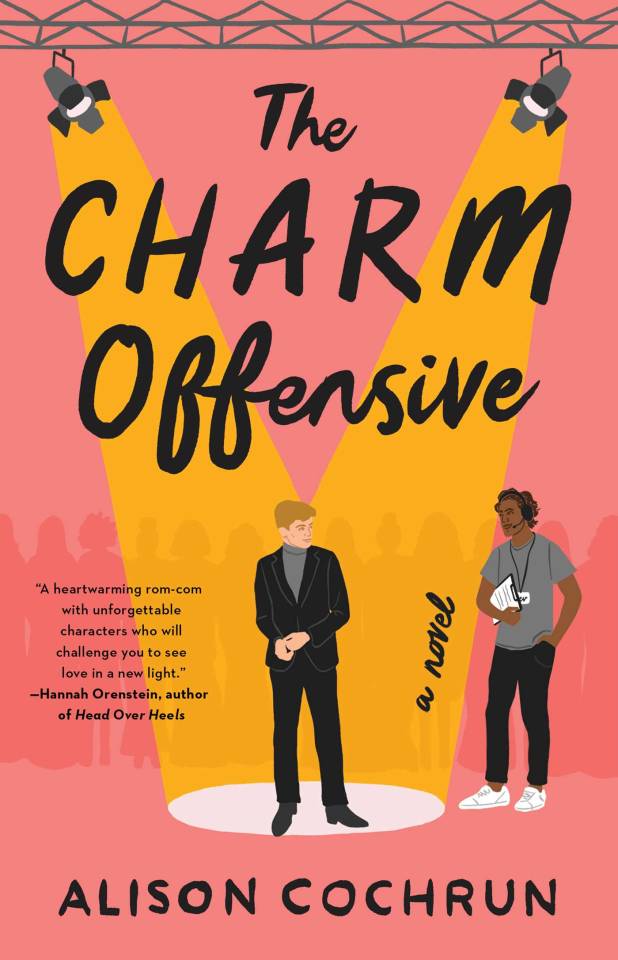
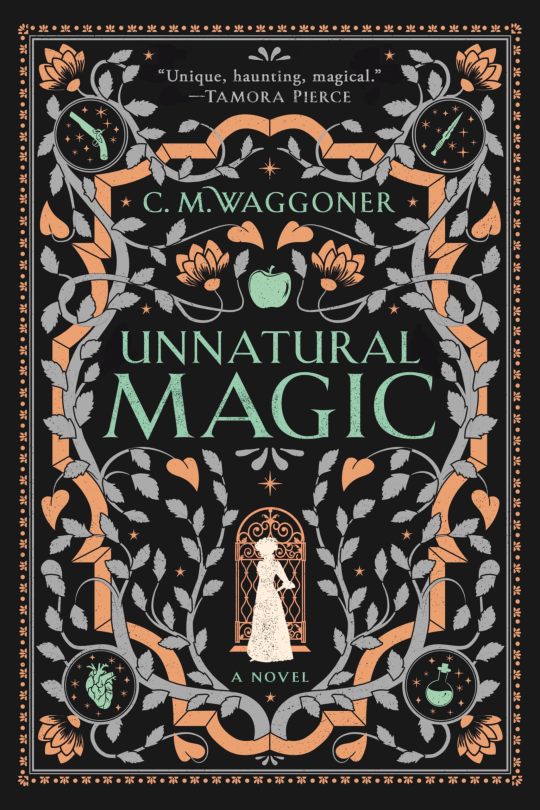
Book summaries and submitted endorsements below:
The Charm Offensive by Alison Cochrun
Dev Deshpande has always believed in fairy tales. So it’s no wonder then that he’s spent his career crafting them on the long-running reality dating show Ever After. As the most successful producer in the franchise’s history, Dev always scripts the perfect love story for his contestants, even as his own love life crashes and burns. But then the show casts disgraced tech wunderkind Charlie Winshaw as its star.
Charlie is far from the romantic Prince Charming Ever After expects. He doesn’t believe in true love, and only agreed to the show as a last-ditch effort to rehabilitate his image. In front of the cameras, he’s a stiff, anxious mess with no idea how to date twenty women on national television. Behind the scenes, he’s cold, awkward, and emotionally closed-off.
As Dev fights to get Charlie to connect with the contestants on a whirlwind, worldwide tour, they begin to open up to each other, and Charlie realizes he has better chemistry with Dev than with any of his female co-stars. But even reality TV has a script, and in order to find to happily ever after, they’ll have to reconsider whose love story gets told.
Romance, contemporary, adult
Unnatural Magic by C.M. Waggoner
Endorsement from submitter: "two of the best fantasy novels [Unnatural Magic and The Ruthless Lady's Guide to Wizardry] I've read in a long time. Unnatural Magic follows a young woman who sets out to get an apprenticeship from the country's head wizard himself after being denied entry to the all boys magic school near her village. Meanwhile, a solitary troll and a deserting soldier develop a relationship that goes against the standards of both their societies and turn gender roles on their head (an m/f relationship that had me saying "oh my god this is gay"). The Ruthless Lady's Guide to Wizardry follows a poor fire witch, stigmatized for her innate magic, as she gets a job guarding a noblewoman on a cross-country trip… and attempting to win the affections of another guardswoman as they avoid assassination attempts. They're set in the same universe and the characters from Unnatural Magic are minor characters in Ruthless. Both are part murder mystery, part Victorian-inspired fantasy, part queer romance, and they deserve more love!"
Onna can write the parameters of a spell faster than any of the young men in her village school. But despite her incredible abilities, she’s denied a place at the nation’s premier arcane academy. Undaunted, she sails to the bustling city-state of Hexos, hoping to find a place at a university where they don’t think there’s anything untoward about providing a woman with a magical education. But as soon as Onna arrives, she’s drawn into the mysterious murder of four trolls.
Tsira is a troll who never quite fit into her clan, despite being the leader’s daughter. She decides to strike out on her own and look for work in a human city, but on her way she stumbles upon the body of a half-dead human soldier in the snow. As she slowly nurses him back to health, an unlikely bond forms between them, one that is tested when an unknown mage makes an attempt on Tsira’s life. Soon, unbeknownst to each other, Onna and Tsira both begin devoting their considerable talents to finding out who is targeting trolls, before their homeland is torn apart…
Fantasy, murder mystery, romance, secondary world, adult
#polls#queer fiction free for all#the charm offensive#alison cochrun#unnatural magic#c.m. waggoner#cm waggoner#books#fiction#booklr#lgbtqia#tumblr polls#bookblr#book#lgbt books#queer books#poll#queer fiction#fiction books#book polls#queer lit#queer literature
11 notes
·
View notes
Text
Cybermancy Class Channeled
I just channeled this entire class from the spirits.
Email Enchantments are a form of magic that the first Cybermancers discovered when the Net was still being fleshed out. It allowed for the use of sending information from one person to another as the mortals of Earth use it for. However, the magical applications of email are as follows.
Email Enchantments can be used for sending spells to people as attachments, astral projection, teleporting from one place to another, and even scrying. Today we will be working in a practical sense. You will each be assigned to practice the following list of applications of email enchantments and develop three new applications minimum of email enchantments.
Homework:
Create 3 new applications of email enchantment
Practice email enchantments for
Astral projection
Divination
Spell Casting
Astral teleportation
Next we will focus on the concept of Cybermancy potion making. Now, I know that many of you are inventive enough to have your own methods of cybermantic potion making, but today we will be focusing on a form of potion making that is a bit more structured than the artistic forms that you are used to. On the desk before you is the textbook we will be using regarding Cybermancy magic and digitizing traditional magic. This book is going to change depending on what we cover in class so do not lose your link to it.
Cauldron of Cybermancy: Digitizing the Traditional Arts of Sorcery
Chapter 1
Cybermancy is a new form of magic that relies on computers and the creative activities of the mind to perform alchemical acts that make the impossible possible. Essentially, it is using computers and technological devices to create magic through electricity and coding. The act of digitizing magical traditions such as witchcraft arts to allow for easier access and alternative applications when traditional methods are out of reach is the main focus of cybermancy. To that end, it is the duty of every cyber witch or cyber wizard to further the art of cybermancy and find new ways to apply it. This is where the fun begins. There is no set structure to cybermancy. The only thing that is required to practice is a computer and a connection to the internet and in some cases not even the latter.
Cybermancy applications
Cybersorcery comes in many forms and styles. While some focus on true coding and use languages that can be utilized for actual mundane programming, others focus on the meta-programming and hack reality through pseudocode. In Cybermancy, potions are playlists or programs and spells are scripted incantations and rituals. Divination can be done by way of a virtual tarot deck or even just a simple spell. The possibilities are endless. Above all, Cybermancy is chaos personified.
Cybermancy Potion-making
There are three steps to a well formulated Cybermancy potion.
Step 1: Choose your format (Folder based, Code based, Playlist based, Image based, Writing based). The format you choose will be determine your method of adding ingredients and the container you use.
Step 2: Collect and add your ingredients
Step 3: Seal the potion with a spell.
For the purpose of this lesson we are going to work with a simple pseudocode based potion.
To start out, we must first define the cauldron as a container. The command for this is as follows.
Open Cauldron.tool
Next we turn on the heat.
Cmd_TurnOnHeat.tool
Now we must add the ingredients.
ins(Water.ingredient)
ins(Cinnamon.ingredient)
ins(Mint.ingredient)
ins(Rosemary.ingredient)
ins(Salt.ingredient)
Now we stir with the following command.
Cmd_StirCauldron/Clockwise
Cmd_StirCauldron/Counterclockwise
Cmd_StirCauldron/Clockwise
Cmd_StirCauldron/Counterclockwise
Cmd_StirCauldron/Stop
Now we turn off the heat
Cmd_TurnOffHeat.tool
Next we seal it with a spell
InvokeSpellVerse: “Inspire knowledge and seeking true, Bring forth memory enhancement to this brew.”
Lastly, we seal the whole potion with the command
BottleBrew.hex
Homework:
Create 6 new potion recipes using ingredients that only exist on your respective worlds. Using the pseudocode method, you are to prepare these brews and connect them to a physical item through email enchantment.
Class dismissed
7 notes
·
View notes
Text
TransScript Wizard of Oz
A script is a media used to help map out the system's inner world, parts, and purpose for programmers.
The blue represents Dorothy.
The yellow represents the Lion.
The grey represents the Tin Man.
The green represents the Witch.
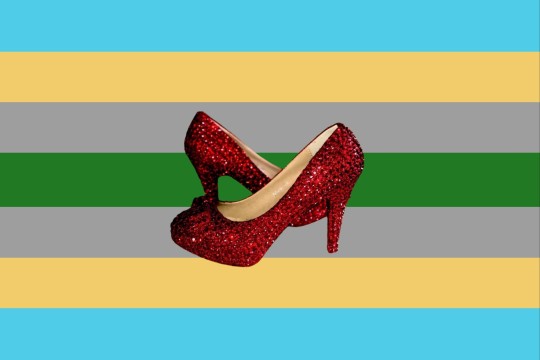
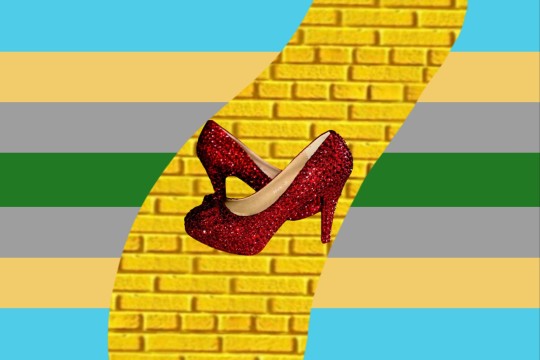
[ Image ID: 7 horizontal striped flag with blue, yellow, dark grey, dark green, dark grey, yellow and blue strips. In the middle is a pair of red sparkley heels. The right flag has a vertical curved yellow brick stripe. End ID ]
If a flag for this already exists consider this an alternative!
#my coins#transid#radqueer#transramcoa#transtbmc#transscript#transprogrammed#transharmed#radqueer coining#transid coining#transabled#para safe#endo safe
21 notes
·
View notes
Text
Qunlat 1/??: Introduction
⭅ Previous =⦾ Index ⦾= Next ⭆
First dive into canon Qunlat! I’ll be starting with a bit of history and background on constructed language creation, what I think the strengths and weaknesses of Qunlat are, and how they likely came about.
Note: This post and all others in the series will contain image alt-text that includes optional side-material. It's not necessary to read to understand the main text, but it does contain spicy details like "How old is Sten?" and "who could the Witch-King of Angmar have been defeated by, if the prophecy about him had been written in Qunlat?"

People have always been making new languages–ever come up with a secret code between friends, siblings, or partners? Congratulations! You’ve dabbled in making a new language.
Constructed language creation goes back many centuries–usually for religious use, such as Hildegard von Bingen’s mystical use of her Lingua Ignota. In the 18th and 19th century, an interest in language reform and international communication created attempts at more “logical” and “universal” languages like Esperanto, Volapük, Ido, and Novial. Constructing new writing systems also has a long and successful history–Hangul is used by 81 million people! The Cherokee syllabary, wholly created by the singularly dedicated Sequoyah, is still in use today!
But for our purposes, the story starts with a fellow named Tolkien.
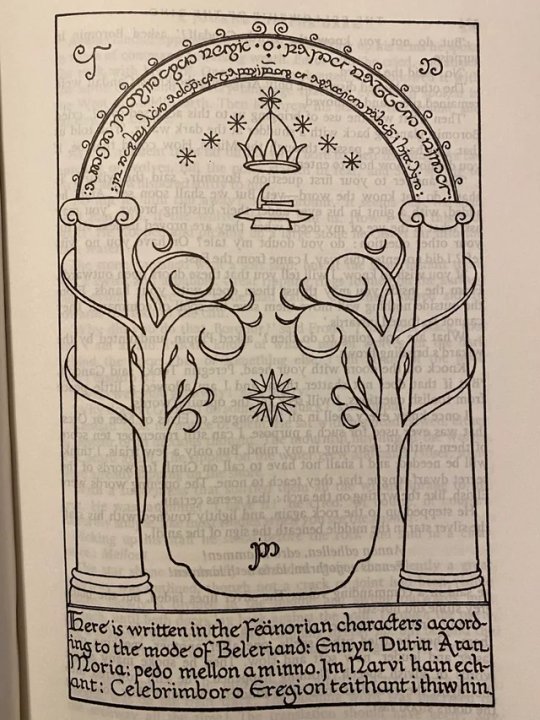
As a historian, linguist, and big ol’ nerd who wanted to write a mythological epic, Tolkien famously built the elven languages of Middle Earth first, and then folded the rest of the world around them. He also produced limited amounts of Khuzdul (dwarvish), Adûnaic, Rohirric, Entish, and the Black Speech, creating a rich and alive-seeming world in the process.
Ever since him, big ol’ nerds have been influenced by this. Most constructed languages since have flourished in the hobbyist space of “conlangers”, folks like me who do this for fun. And oh boy, is it fun. Here’s a sample of an original language I’ve created:

But the most well-known conlangs sit at the intersection of art and commerce: languages constructed for mass media. These have a unique set of constraints, which will explain a few things about Qunlat. Yes, I promise, I haven’t forgot about Qunlat. I’m just excited to talk about my hobby.
When Star Trek made the jump to the big screen, James Doohan threw together some words that linguist Mark Okrand eventually transformed into the Klingon language. Doohan wasn’t really focused on making a usable language, he just wanted something that sounded right–it had “phonaesthetics” that matched the audience perception of the Klingons. This created something unfamiliar to English speakers, requiring you to make guttural sounds that most dialects of English never touch. Phonaesthetics were also among Tolkien’s leading principles with his languages–Quenya was influenced by the sounds of Latin and Finnish, Rohirric by Old English, and the Black Speech by the extinct Hurrian language. To him, these had certain associations that informed the character of the language’s speakers.

Phonaesthetics are usually priority number one in constructed languages that appear in mass media. While many modern projects will hire professional linguists to create something robust and to instruct actors on how to speak their lines, this isn’t always the case. In fact, it’s a very recent development.
Mostly, constructed languages have been the province of some jobbo in the writer’s room or sound department, who has fifteen other things they have to be doing. They create something they think sounds good, and then send it off in the script. When the conlang is plonked down in front of an actor, they may not be given any direction on pronunciation, because nobody in the room has been given a pronunciation guide.
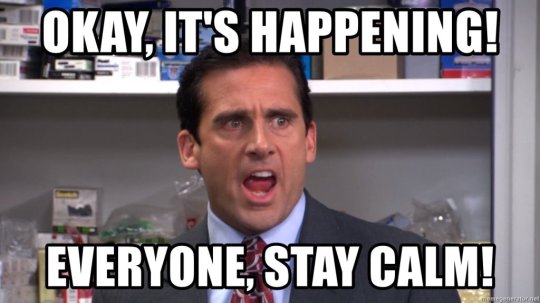
All this is to say: Many constructed languages in media are produced very quickly, they’re poorly-documented, and they’re often performed by people who haven’t been coached on their use. Those that survive are often passed through multiple hands, which may lead to refinement of the language, or artistic direction may be lost.
Qunlat has a lot of the hallmarks of this sort of language. So does Elvhen, but I’m only passingly familiar with it. Qunlat, though. It has a very simple, very Indo-European language structure, which primarily functions in ways English considers “default”.
This is very common when an English-speaker makes a constructed language without a lot of practice: you write what you know, after all. And because most people never have to think too hard about their native language, they recapitulate the bits they think are vital, shave off a lot of the complexities that they don’t want to deal with, and never replace them with anything else. If a complex sentence does rear its head, something is slapped together ad-hoc. There are specific examples I can point to throughout the series that fit these patterns.
The phonaesthetics of Qunlat also have the hallmarks of a project that’s passed through many hands, or been poorly documented. While it began with a fairly strong sense of phonaesthetics, some additions are notable for their dissonance with the rest of the language. It's on a journey without a road to follow.

So while I focus on canon Qunlat, I’ll also be trying to point out the things I like, and the rough edges that make things difficult or uncertain, while attempting to take an understanding view of it all–Heck knows, I’ve made some real clunkers in my time as a conlanger, and I didn’t have to publish any of it on a deadline.
We start with a discussion on how I’ll be handling sources next time, as Dragon Age is… well, it’s complicated.
⭅ Previous =⦾ Index ⦾= Next ⭆

14 notes
·
View notes